Flock Safety System
Automatic License Plate Readers (ALPR) have long helped law enforcement in solving crimes. ALPRs capture computer-readable images of license plates, allowing law enforcement agencies to compare plate numbers against those of stolen cars or cars driven by people suspected of being involved in criminal activities.
The information by ALPR cameras can help determine whether a vehicle was at the scene of a crime and to discover vehicles that may be associated with each other. Law enforcement agencies can choose to share their information with other agencies. The cameras can also integrate information from national or state crime databases to provide real-time alerts when a vehicle associated with a known suspect or a stolen vehicle passes the camera.
According to the National Conference of State Legislatures, when employed ethically and objectively, ALPRs are an effective force-multiplying tool for law enforcement. A 2011 study by the Police Executive Research Forum concluded that ALPRs used by Mesa, Ariz., Police resulted in “nearly 3 times as many ‘hits’ for stolen vehicles, and twice as many vehicle recoveries.”
Flock Safety communities have reported overall crime reductions of over 70 percent after a period of time utilizing the ALPR system. In some areas, that included an over 60 percent reduction in non-residential burglaries, 80 percent reduction in residential burglary, and an over 40 percent reduction in robberies.
What is Flock Safety?
Flock Safety is a public safety operating system that helps communities and law enforcement work together to eliminate crime, protect privacy, and mitigate bias. We build devices that capture objective evidence and use machine learning to detect and deliver unbiased investigative leads to law enforcement. Flock Safety communities have reported crime reductions of up to 70 percent.
Today, there are over 1,500 Flock Safety communities; we partner with 1200+ law enforcement agencies. The Buffalo County Sheriff’s Office has partnered with the Kearney Police Department under their MOU with the FLOCK Safety System.
Kearney Police Department Flock Transparency Portal
Buffalo County Sheriff’s Office Automated License Plate Reader (ALPR #1346)
Nebraska Revised Statutes – Automatic License Plate Reader Privacy Act 60-3201 to 60-3209
Flock ALPR Data Year End Report
Vigilant Mobile ALPR Year End Report
ExpressVote
The ExpressVote is:
• A paper-based marking device that uses touch-screen technology to produce a paper ballot
• ADA friendly-has ports for headphones and other accessibility devices
• Easier to read because of visual aids that include high contrast and zoom functionality
• Available to everyone for use at each polling location on election day
• Available for use at the Election Office 30 days before any election date
How to vote on the ExpressVote - essvote.com/blog/video/video-expressvote-how-to-vote/
Board of Commissioners Meetings 2022
Buffalo County furnishes the public information contained herein as a public service. This information may not reflect the most recent resolutions of the County Board and if the resolutions need to be legally relied upon, the most current version may be obtained at the office of the County Clerk. Please also read the disclaimer statement and the Open Meetings Act.
The next regularly scheduled Board meeting will be Tuesday, January 10, 2022, at 9:00 a.m. in the Buffalo County Board of Commissioners Board Room located at 1512 Central Ave., Kearney, Nebraska.
- Board Packet for current meeting
Dates
|
Agendas |
Minutes |
|
January 11, 2022
|
Agenda
|
Minutes |
|
January 25, 2022
|
Agenda
|
Minutes |
|
February 8, 2022
|
Agenda |
Minutes
|
|
February 22, 2022
|
Agenda |
Minutes
|
|
March 8, 2022
|
Agenda |
Minutes
|
|
March 22, 2022
|
Agenda
|
Minutes
|
|
April 12, 2022
|
Agenda
|
Minutes
|
|
April 26, 2022
|
Agenda
|
Minutes
|
|
May 10, 2022
|
Agenda
|
Minutes
|
|
May 24, 2022
|
Agenda
|
Minutes
|
|
June 14, 2022
|
Agenda
|
Minutes
|
|
June 28, 2022
|
Agenda
|
Minutes
|
|
July 12, 2022
|
Agenda |
Minutes
|
|
July 26, 2022
|
Agenda |
Minutes
|
|
August 9, 2022
|
Agenda
|
Minutes
|
|
August 23, 2022
|
Agenda
|
Minutes
|
|
September 13, 2022
|
Agenda
|
Minutes
|
|
September 27, 2022
|
Agenda
|
Minutes
|
|
October 11, 2022
|
Agenda
|
Minutes
|
|
October 25, 2022
|
Agenda
|
Minutes
|
|
November 8, 2022
|
Agenda
|
Minutes
|
|
November 22, 2022
|
Agenda |
Minutes
|
|
December 13, 2022
|
Agenda |
Minutes |
|
December 27, 2022
|
Agenda
|
Minutes
|
2021 Archive
2020 Archive
2019 Archive
2018 Archive
2017 Archive
2016 Archive
2015 Archive
2014 Archive
2013 Archive
2012 Archive
2011 Archive
2010 Archive
Facilities General Information
The Buffalo County Facilities OMP department strives to provide extraordinary, professional and reliable building management services for all of the county facilities. Our Facilities Staff are trained professionals who are committed to providing a clean, safe, secure and functional building environment for both the county staff and the general public. Buffalo County Facilities OMP includes Operations (Custodial and Maintenance), Management (Facility Rental Use and Administrative Services), and Planning (Short term and long term improvements).
The 14 members of the Facilities OMP staff are responsible for maintaining all County Government buildings, including the Courthouse, Judicial Center, County Jail, Highway Department
buildings, Extension Building, 4 office buildings, and a recreation area with a lake and campground. There are over 30 buildings in total. In addition to these facilities, Facilities OMP maintains 11 parking lots, all walkways, steps and lawns adjacent to these areas, including landscaping, and provides snow and ice removal during the winter. The staff meet regularly to review work practices and safety regulations. They take part in additional training to keep up to date on the latest practices and procedures
relative to the cleaning, maintenance, security, and protection of County facilities, employees, and the general public.
"Facilities Operations" includes:
Custodial Services
Our Custodial Staff are trained cleaning professionals who are committed to providing a safe, clean and presentable building environment. We provide custodial services for 10 of our County buildings, their entrances, surrounding grounds, and parking areas. These buildings include:
--Buffalo County Courthouse
--Buffalo County Judicial Center
--Buffalo County Jail/EOC Center
--DHHS
--Adult Probation
--Juvenile Probation
--Extension Building
--215 Office Building
--Buffalo County Highway Department
--Buffalo County Weed District
Maintenance Services
Our Maintenance Staff are trained maintenance professionals who are committed to providing a safe, secure and functional building environment. Their work includes:
--Planned/Preventative Maintenance - includes inspections, servicing, general upkeep to buildings, equipment and grounds.
--Reactive/Unplanned Maintenance - repairing breakdowns of our facilities and grounds
--Overseeing underground fuel storage tanks/piping/lines and ensuring compliance with government regulations
--Monitoring/Maintaining Building Management Systems including HVAC controls, fire alarm systems, etc.
--Emergency Maintenance - assessing/repairing/coordinating repairs to critical system breakdowns
--Snow and Ice Removal
"Facilities Management" includes:
Facility Rental Use
The Facilities OMP department is responsible for facilitating the rental use of county facilities. At this time the principle location of this usage is the Buffalo County Extension Building. The responsibility includes:
--Schedule the usage of the Extension Building meeting rooms & kitchen, and maintain the master schedule
--Process all requests for usage of the meeting rooms & kitchen, and insure compliance with Board policies and regulations
--Execute rental contracts for outside group usage and collect rental fees associated with each agreement
--Verify appropriate requirements are met by groups using the facility
--Provide Facility Assistant when required, for groups with alcohol
--Provide proper access to scheduled groups
--Prep building for usage and follow up to ensure that it has been returned in proper condition
Administrative Services
Operations
--Ensure compliance with employment rules/regulations, county policies, and all applicable state and federal laws/regulations
--Oversee the daily operations of the Facilities OMP workforce and the work assignments
--Monitor, inspect and review the daily operations of the County facilities and grounds
--Manage installations, repairs, equipment testing and contracted maintenance by outside sources
--Oversee the development and implementation of operational policies and procedures
--Utilize and administer facility/building management software systems to manage the county facilities
--Coordinate professional development of Facilities OMP staff through training and workshops
--Have a representative on the County safety committee and any other committee as requested
Procurement
--Review and manage contracts related to county facilities
--Manage Facilities OMP equipment, materials and supplies and order inventory/supplies when needed
--Develop and maintain strong vendor and contractor partnerships to ensure the best quality, cost, and customer service for the County.
--Procure building equipment and supplies as needed for facilities
Claims/Accounts Payable
--Review and keep record of monthly bills and claims against Facilities OMP, including all utility bills for all County buildings
Budget
--Develop and manage Facilities OMP budgets, including preparing and maintaining a yearly budget
--Create cost estimates for anticipated individual projects.
--Manage budgeted costs on projects as they occur.
Management Software System - Facility Dude
--Facility management software utilized by the County
--Work tickets are generated by county employees needing custodial or maintenance assistance. All work requests need to be submitted on a work request utilizing Dude Solutions software (FacilityDude).
--Work tickets are assigned to Facilities staff and/or contractors for work orders
--Additional "preventative maintenance" work tickets are also generated with FacilityDude for scheduled servicing/inspecting/upkeep.
--Once the work has been completed, the work tickets are closed out and a follow up email is sent to the requestor to let them know that the work has been completed
--Data is collected from the information inputted into FacilityDude and utilized for managing current costs and projecting future expenses/budgeting
"Facilities Planning" includes:
Planning, Design & Development
--Develop and implement one, two and six year department plans
--Small Scale - Develop and implement small scale adjustments to
existing spaces to keep space up to date and adequate for current
usage needs.
--Large Scale - Coordinate design, engineering and construction of all Capital improvements including new buildings, new additions to existing buildings, and remodels of existing buildings.
--Ensure compliance with all applicable local, state and federals laws and regulations related to buildings and grounds
Property Fraud Alert
PROPERTY FRAUD ALERT SIGN UP NOW!
According to the FBI Property and Mortgage Fraud is the fastest growing white collar crime. It can be as simple as someone recording a document in the Buffalo County Register of Deeds office land records that fraudulently makes it appear as if they now own your property.
To address these concerns, your Register of Deeds Office have a FREE service that will NOTIFY you when or if a document is recorded that matches your personal criteria.
As, your Register of Deeds, I urge you to monitor the Public Real Estate records filed using your name.
SIGN UP NOW!!! It’s simple. Just enter your personal or business name and your contact information and you will be notified by the method selected as any documents are recorded in the future.
Buffalo County, Register of Deeds --- Kellie John
Assessor Calendar
| |
|
| Jan 01 |
Assessment of Real Property (Discovery, List, Value) 77-1301
|
| Jan 01 |
Assessment of Personal Property (Discovery, List, Value) 77-1201 |
| Jan 01 |
R R & Pub Serv req’d Report Non-Operating
Property to Assessor. 77-606 & 77-801 & Calendar
for Railroads & Public Service Entities. |
| Jan 01 |
Effective Date for Filing: Homestead Exemption Claimants MUST be (a) Owner of Record and (b) Occupy the homestead. (c) MUST be 65 or older.(d) Effective Date of Disability and Filing Status. 77-3502 77-3505 |
| Jan 15 |
Mobile Home Court Owner et al files Report w Assessor 77-3706 |
| Jan 31 |
Gov’l Subdivisions provide Assr Off w COPIES OF LEASES or descriptions of Leased property. 77-202.11
|
| Jan 31 |
Deadline for county Board of Equalization to petition the Tax Equalization & Review Commission for use of a different approach to value rent-restricted housing projects. (LB 356) 77-1333
|
| Feb 01 |
Assessor makes recommendations on permissive exemption applications Form 451. To Board of Equalization. Notice must be published in the paper, ten days prior to consideration of applications by the B O E that a list of organizations seeking permissive exemptions, legal descriptions, and Assessor
recommendations is available in the Assessor’s Office. 77-202.01 |
| Feb 01 |
Statements of Reaffirmation Form 451A do not need to be approved by the BOE only by Assessor. 77-202.01
|
| Feb 01 |
Assr issues notice of approval / denial Beginning Farmer Exemption Form 1027 77-5209.02 |
| Feb 01 |
Aircraft Report filed with Assessor. 77-1250.02
|
| Feb 01 |
Last day P.T.A. provide counties w Printed Claim Forms and Address Lists of prior year applicants. 77-3510
|
| Feb 01 |
First day for claimants to file NE Homestead Exemption App or Certification of Status. May fall on Feb 2 or 3 if Feb 1 is on Sat or Sun. 77-3512, 77-3513, 77-3514 |
| Feb 28 |
Seeking Separate Taxation of IOLL &
LAND File Form 402 Improvements on Leased Land Assessment Application 77-1376
|
| Mar 01 |
Certify to P.T.A whether or not Ag & Hort Land are influenced by prices outside of the typical ag-hort land market. REG 17-003.03
If Special Valuation is used, must file specific information w P.T.A.. REG 11-005.04
|
| Mar 01 |
Improvements owner on LEASED PUBLIC LAND may file Form 402P Improvements on Leased Public Land Assessment Application 77-1374
|
| Mar 01 |
ASSR notifies governmental subdivisions of intent to tax property not used for public purpose
and not paying an in lieu tax. 77-202.12
|
| Mar 01 |
PTA submits report of active TIF to the legislature see Research Reports on web site. 18-2117.01
|
| Mar 16 |
Deadline for written request for
Extension of Time from PTA to file the County
Abstract of Assessment
for Real Property (Form 45) and the AVU
Directive 09-1 & 77-1514
|
| Mar 19 |
Must inspect-review portion of real property parcels in county so that all real property parcels are
inspected-reviewed no less than every 6 years. March 19, 2014 completes first 6-Year cycle 77-1311.03
|
| Mar 19 |
Complete the County Abstract of Assessment for Real Property (Form 45) with the PTA (and the Assessed Value Update (AVU)) 77-1301
|
| Mar 19 |
Certify the County Abstract of Assessment for Real Property (Form 45) with the PTA (and the Assessed Value Update (AVU)) 77-1514
|
| Aft Mar 19 |
Overvaluation or Undervaluation. After March 19 and before July 25 (Aug 10 when extension) report to B.O.E. any overvalued or undervalued property. 77-1315.01
|
| Anytime |
Duty to report to BOE all real property omitted from the assessment roll for the current or any former year except when such real property has changed ownership otherwise than by will,
inheritance, or gift. 77-1317, 77-123, 77-124,
|
| Anytime |
Correct the tax rolls as provided in section 77-1613.02 for any real property listed on the Assessment roll but omitted from the tax
roll. 77-1316.01
|
| Anytime |
BOE may meet at any time for correction of clerical errors defined in 77-128. 77-1507 (Clerical error means transposition of numbers, mathematical error, computer malfunction causing programming and printing errors, data entry error, items of real property other than
land identified on the wrong parcel, incorrect ownership, or certification of an incorrect valuation
to political subdivisions.) 77-128
|
| Mar 25 |
Assessorr may submit written comments to P.T.A. that become part of R & O REG 17-003.04
|
| Apr 01 |
If homestead exemption notices mailed on or before Feb 01 did not contain all of The statutorily required information a 2nd notice must be sent on/before April 01. 77-3513, 77-3514
|
Apr 01
|
If homestead exemption notices mailed on or before February 1 did not contain all of The statutorily required information, a 2nd notice must be sent on or before April 1 77-3513 77-3514
|
Apr 01
|
Last day to send a RE-APPLY reminder to eligible previous year homestead Exemption
applicants. 77-3513, 77-3514
|
| May 01 |
First-1/2 Real & Personal Property Taxes for Prior Year become delinquent 77-204
|
| May 01 |
Deadline File Ne Personal Property Return & Schedule w/o penalty. 77-1229
|
| May 01 |
Deadline w Agreement, File Form 775P &/or Form 312P Claim for P P Exemption & supporting schedules 77-4105 (2)(c ) & 77-5725 (7)(c)
|
May 01
|
First ½ of real & personal property taxes for prior assessment year become delinquent If unpaid in counties with less than 100,000 population. 77-204
|
| May 01 |
Deadline Physician’s Certificate for LATE
Homestead Exemption filing FORM 458L In counties less than 100,000 population. 77-3512, 77-3513, 77-3514.01
|
| May 15 |
Last Day for T.E.R.C. to adjust the valuation
of a class/sub-class of real property. 77-5028
|
| May 30 |
Deadline TREA & ASSR file FORM 458X
amended homestead exemption summary Certificate for tax loss previous year (NOTE: 458X may be filed reflecting changes based on income ANYTIME up to 3 years after the exemption year.) 77-3523 and 77-3517
|
| May 31 |
School system of County Official may request
corrections to school adjusted valuation due to tax list corrections of the prior assessment year. 79-1016
|
| Jun 01 |
Assr publishes a notice in the newspaper CERTIFYING the (a) assessment roll is Complete, (b) notices of valuation changes have been mailed, and (c) stating the final date for filing protests with the B O E 77-1315
|
| Jun 01 |
Freeholder files petition with local board (Assessor, Treasurer & Clerk) to have school districts changed which is contiguous to that land. 79-458(1)
|
| Jun 1 - Jul25 |
B O E holds hearings to review property valuation PROTESTS 77-1502
|
| Jun 5
|
If T.E.R.C. ordered changes, Assessor re-Certifies the Abstract with PTA 77-5029
|
| Jun 6 |
Assr mails assessment sales ratio stats given
by TERC to media & posts in office. 77-1315
|
| Jun 15 |
Assr prepares a PLAN OF ASSESSMENT report for the next 3 years. 77-1311.02
|
| Jun 30 |
Deadline for filing Homestead Exemption App
or Certification Of Status, Form 458 77-3512
|
Jun 30
|
Deadline Late Application and Written Request B O E for Waiver of Late Filing for permissive
exemptions Forms 451 or 451A 77-202.01
|
| Jun 30 |
Deadline. SPECIAL VALUATION application Ag-Hort use. Form 456 77-1345
|
Jun 30
|
Deadline file property valuation protest with
County Clerk (for BOE) 77-1502
|
Jun 30
|
Deadline P P Valuation Protest Returns filed
Jan 1 thru May 1 with County Clerk 77-1502
|
Jun 30
|
Deadline. SPECIAL VALUATION application Ag-Hort use. Form 456 77-1345
|
| Jun 30 |
Last day to add Personal Property value with a 10% Penalty 77-1233.04
|
| Jul 01 |
Added Personal Property is subject to 25%
Penalty from this date forward. 77-1233.04
|
| Jul 15 |
ASSR approves-denies SPECIAL VALUATION apps; notifies applicant before July 22 77-1345.01
|
| Jul 20 |
If deadline extension granted by B O E, new
Deadline for filing Homestead Exemption App or Certification Of Status, Form 458 77-3512
|
| Jul 20 |
County Assr electronically certifies the County Personal Property Abstract Report to the P.T.A. (beginning 2016) (LB 259) 77-1514
|
| Jul 22 |
Assr notifies applicants of special
valuation of approval or disapproval 77-1345.01
|
Jul 22
|
BOE sends notice of value change on Special Valued land if no notice previously Sent by Assr prior to June 1.
|
| Jul 26 |
BOE petition T.E.R.C. for an adjustment to the valuation of a class/sub-class of property. (NOTE: If protest period extended, BOE waives right to petition.) 77-1504.01; 77-1502
|
| Jul26-Aug24
|
Taxpayer file appeal of BOE to T.E.R.C. 77-1510
(NOTE: may file appeal to T.E.R.C. on/before Sep 10 for extended counties)
|
| Jul 31 |
Last day ASSR send Notice of Rejection of Homestead Exemption Form 458R 77-3516
|
Jul 31
|
Assr files 3-Year Plan Of Assessment with the BOE 77-1311.02
|
Jul 31
|
Last day for Annexations Pol Subs for taxable value in current year. 13-509(NOTE: Annexation by
Pol Subs on/after Aug 1 considered next year
taxable)
|
| Aug 01 |
Last day FORWARD approved Homestead Exemption Application or Certification of Status, Form 458, with Disability Certifications, Form 458B, or Veterans Affairs Letters, and Form 458 Schedule I – Income Statements to Tax Commissioner. 77-3517
|
Aug 01
|
Assr reviews ownership & use of all cemetery real property and reports to BOE. 77-202.10
|
Aug 01
|
Last Day Pol Sub submit request for LEVY ALLOCATION to BOE or CITY. 77-3443
|
Aug 01
|
CITY or Community Redevelopment Authority (CRA) files NOTICE to Divide Tax For Comm Redevel Project (T I F) with the County Assr. 18-2147(3)
|
| Aug 01 |
PTA certifies to T.E.R.C. the ASSR implemented the equalization orders. 77-5029
|
| Aug 01 |
Tax Commissioner certifies Exempt P P for Employment & Investment Growth Act Form
775P and Nebraska Advantage Act Form
312P ; notifies Taxpayer and County Assessor. 77-4105; 77-5725(c)
|
| Aug 02 |
County Clerk mails notice of B O E decisions
to protestors. 77-1502(4)
|
| Aug 10 |
Last Day T.E.R.C. act on BOE petition.. 77-1504.01
|
| Aug 10 |
T.E.R.C. sets equalization rate for real property of Centrally Assessed Railroads and Public Service
Entities. 77-5022
|
| Aug 10 |
PTA certifies distributed taxable value of Centrally Assessed Property to Assessor. 77-5030
|
| Aug 15
|
Approved Freeholder Petition filed on/before June 1 of current year become Effective. 79-458(3)
|
Aug 15
|
ASSR approves/denies Homestead Exemption based on Ownership or Occupancy From Jan 1 through Aug 15 77-3502
|
Aug 15
|
Deadline for Homestead Exemption to file an Application for Transfer Form 458T 77-3509.01
|
| Aug 20
|
Certify taxable valuations & growth value to political subs. Certify current values For each T I F project to City or Community Redevelopment Authority (CRA) and to Treasurer 13-509; 13-518; 18-2148
|
| Aug 20
|
If T.E.R.C. orders changes for B O E petitions, ASSR re-certifies ABSTRACT (Form 45) to PTA 77-1504.01
|
| Aug 24
|
Last day taxpayer appeals B O E decision to T.E.R.C. 77-1510
|
| Aug 25 |
ASSR certifies School District Taxable Value Report to P.T.A.. 79-1016
|
| Aug 31
|
Annual Inventory County Personal Property in custody of Assessor 23-347
|
Sep 01
|
Second-1/2 Real & Personal Property Taxes for Prior Year become delinquent 77-204
|
Sep 01
|
After B O E value adjustments, Assr determines AVERAGE RESIDENTAL VALUE For homestead exemption and certifies the Homestead Exemption Certification of Average Assessed Value of Single-Family Residential Property Form 458V to PTA 77-3506.02
|
Sep 01
|
No LEVY allocation change after this date except by agreement by LEVYING Authority and Political
Subdivision. 77-3443
|
| Sep 10 |
Where B O E extended Protest Hearings, Last day Protestor appeal BOE decision to T.E.R.C 77-1510
|
| Sep 15 |
B O E last day for decision on Under or Over Valued Property 77-1504
|
| Sep 15 |
P.T.A. certifies the amount of Real Property TAX CREDIT to State Treasurer and to each county. 77-4212
|
| Sep 20 |
BUDGETS must be Final and Filed with the levying board and State Auditor. 13-508
|
| Sep 30 |
ASSR may amend the School District Taxable Value Report for corrections or errors 79-1016
|
| Sep 30 |
BOE publishes list of Permissive Exemptions and sends list and proof of publication To P.T.A. 77-202.03 (5)
|
| Oct 1 |
Rent-Restricted Housing Projects file INCOME &
EXPENSE STATEMENTSs and any Other Info requested by Assr with both Assr & Tax Commissioner. (LB 356). 77-1333
|
| Oct 1 |
Rent-Restricted Housing Projects file INCOME &
EXPENSE STATEMENTS and any Other Info requested by Assr with both Assr & Tax Commissioner. (LB 356). 77-1333
|
| Oct 9 |
Last Day for voter approval to exceed LEVY limits or final allocation at election or “town hall meeting.” 77-3444
|
| Oct 10 |
P.T.A. certifies the school adjusted valuations to
Dept of Ed, School systems, and County Assessors. 79-1016
|
| Oct 10 |
P.T.A.certifies the school adjusted valuations to
Dept of Ed, School systems, and County Assessors. 79-1016
|
| Oct 13 |
Political Subs forward resolution setting a tax request different from the prior year to County Clerk 77-1601.02
|
| Oct 15 |
LEVY DATE Last day
B O E to set tax rates/levies 77-1601
|
| Oct 15 |
Last Day taxpayer file B O E appeal to T.E.R.C. re under or over valued property 77-1504
|
| Oct 31 |
Assr submits 3-Year Plan and any Amendments to Dept of Revenue 77-1311.02
|
| Nov |
Rent-Restricted Hsg Projects Valuation Committee meets annually in November to Examine Rent-Restricted Hsg Projects statements & expense reports in order to Calculate a Market-derived Capitalization Rate. (LB 356) 77-1333
|
| Nov 1 |
Last Day Tax Comm certifies qualified Homestead Exemption income determinations to the County
Assessor. 77-3517
|
| Nov 5 |
Last Day B O E correct levies/tax rates as a result
of clerical error. 77-1601
|
| Nov 10 |
Deadline school sys file appeal with Tax Comm
for the School Adjusted Value Certified for use in the school aid formula. 79-1016
|
Nov 10
|
School Dis or County Off deadline file written
request w Tax Comm correction school adjust
value due to clerical error or SPECIAL
VALUATION ADDITIONS 79-1016 |
| Nov 15
|
Deadline. EXEMPT TO EXEMPT. For an org to file a permissive exempt application For property it purchased between July 1 and levy date previously exempt. 77-202.03
|
| Nov 22 |
Deliver Signed WARRANT For Collection Of Taxes To Treasurer having completed the tax list for real and personal property. 77-1616
|
| Nov 30 |
Deadline ASSR & TREA certify to P.T.A. Homestead Exemption Summary Certificate Form
458S for tax loss due to homestead exemptions for the current tax year.(Both signatures required) 77-3523
|
| Nov 30 |
Deadline for ASSR & TREA certify electronically the Personal Property Tax Loss Summary Certificate for personal property exemption for locally assessed property(beginning 2016) (LB 259) 77-1239
|
| Dec 01 |
Assr files Certificate of Taxes Levied (CTL)
with P.T.A. 77-1613.01
|
| Dec 01 |
City or CRA (Community Redevelopment Authority) files report with P.T.A. for approved tax
increment financing projects (T I F) 18-2117.01
|
| Dec 01 |
Last day Property Tax Administrator (P.T.A.)
forwards copy of Rent-Restricted Housing Projects annual report by the Valuation Committee to ASSR for Cap Rate In determining value of rent-restricted
housing projects. (LB 356) 77-1333
|
| Dec 01 |
Deadline for ASSR to ensure sales data in state sales file is accurate and all sales Are included. Directive 12-05 |
| Dec 31 |
Real Property & Personal Property Taxes Due – LIEN DATE 77-203
|
| Dec 31 |
Permissive Exemption Application deadline For newly acquired property or in years divisible by four, file Exemption Application Form 451
For interim years, file Exemption Application Form 451A
For example: File Form 451A by Dec 31, 2014 to
reaffirm for assesssmt year 2015 File Form 451 by Dec 31, 2015 to apply for assessmt year 2016 (which is divisible by 4) 77-202.01; 77-202.03
|
| Dec 31 |
Deadline. Form 1027 Exemption App Qual Beginning Farmer / Livestock Producer Must be filed with Assr on-before Dec 31 in the year preceeding year applied for.Exemption is for
Personal Property tax on ag-hort machinery & equipment. 77-202.01; 77-5208; 77-5209.02
|
Dec 31
|
Deadline for taxpayer/owner to file Vacant or
Unimproved Lot Application, Form 191To elect to have 2 or more lots held for sale/resale to be treated as one parcel for Property tax purposes. 77-132
|
Dec 31
|
Owner petition T.E.R.C. determine taxable status of real property – if a failure to give proper notice prevented the timely filing of a protest or appeal for exempt property.
|
Dec 31
|
Last Day for Tax Commissioner to review income and other information for the third Preceding year and take any action. 77-3517
|
| May 01 & Sept 01 |
First 1 / 2 and 2nd 1 / 2, Real and Personal Property Taxes for prior assessment year Sept 01 become delinquent, if unpaid, in counties with a population less than 100,000 pop’n. 77-204
|
Permissive Exemptions
Property owned by religious, educational, charitable and cemetery organizations (or organizations organized and operated exclusively for the benefit of religious, educational, charitable and cemetery organizations, may obtain an exemption from property taxes in Nebraska, in whole or in part. There is a five-part test that must be met for the property to qualify. The test is:
- The property must be owned by a religious, educational, charitable or cemetery organization;
- The property must be used exclusively for religious, educational, charitable or cemetery purposes;
- The property may not be used for gain or profit for the owner or the user;
- The property may not be used for the sale of alcoholic liquor for more than 20 hours a week; and
- The property may not be owned or used by an organization which discriminates in membership or employment based on race, color, or national origin.
All five parts of the test must be met for property to qualify for tax exemption in Nebraska. An organization simply holding a tax exempt certificate from the Internal Revenue Service does not qualify property owned by the organization in Nebraska for a property tax exemption.
Permissive exemptions require an annual application with the County Assessor. In the first year for which an exemption is sought and subsequent years divisible by four, the organization seeking the exemption must file a Form 451. In the years in which the Form 451 is not required, the organization must file a Form 451A with the Assessor’s Office. Regardless of which form is required, the applications must be filed with the Assessor’s Office on or before December 31 of the year prior to the year for which the exemption is sought.
For additional questions or concerns, please contact our office:
Phone: (308)236-1210
Email: assessor@buffalocounty.ne.gov
Register of Deeds Records Online Information
Search County Land Records 24 Hours a Day!
Laredo
Designed for users who consistently search in a single county
Fidlar Software has designed Laredo, a remote access product, with your objectives in mind. Laredo’s innovative technology and 24-hour access to the county’s land records allows you to obtain information faster and more efficiently.
Benefits
- Same user interface that is used on the courthouse workstation
- Real time, 24/7 access
- Customizable results screens
- Subscription based
Cost Breakdown:
Per-minute Plan Charges
| Minutes |
Price/Month |
Overage Charge/Minute |
| 0-250 |
$75 |
$0.25 |
| 251-500 |
$125 |
$0.20 |
| 501-1000 |
$200 |
$0.15 |
| 1001-2000 |
$300 |
$0.10 |
| Unlimited |
$450 |
|
**Per minute charge for each minute over the signed-up plan
To Sign Up:
To become a Laredo Subscriber please contact the Buffalo County Register of Deeds Office @ 308-236-1239.
To Search:
Once you have signed up, and have been issued a username and password, go to the Fidlar website select Nebraska as the state, then Buffalo as the county, and click download.
Tapestry
Designed for the occasional users or those who want the freedom to search in all Fidlar counties
All you need is a web browser for 24/7 access to county land records. From the Tapestry web site, users can access information from ALL participating counties. Tapestry allows for both pay-as-you-go access, and an open account payment plan.
Benefits
- 24/7 Remote Internet access
- Secure browser based access
- Search via many data parameters (grantor/grantee, date range, document number, legal description, etc.)
Tapestry Cost Breakdown
- Index/Image Search - $8.75 per search
- Grantor/Grantee
- Beginning/Ending Date
- Consideration amount
- Legal description - Subdivision, parcel ID, Metes & Bounds
- Document search types
- Print copies - $1.00 per page
- Viewing images is included in the per search fee
Flexible Payment Options:
- Pay-as-you-go with a credit card - Visa & MasterCard accepted
- Open Account Payment Plan - $25 minimum per month
The Desktop Buffalo Alert Application Is No Longer Supported
As of May 1st, 2014, Buffalo County Emergency Management will no longer support the Desktop Buffalo Alert Application. For continued weather alerts and emergency information please SIGN UP for our NEW ‘Cell Phone” and “E-mail” alerts at BuffaloWatch.net. Follow us on Facebook "Emergency Management Buffalo County/City of Kearney" and on Twitter @BuffaloCoNeEM. We apologize for any inconvenience the discontinuation of this desktop alert app may cause.
Defendant's Rights
We are dedicated to the principles of the Constitutions of the United States and of the State of Nebraska. A person accused of a crime has these rights (includes Spanish translation):
- The right to a bond. If the accused cannot afford a bond, they may seek a personal recognizance bond or a bond reduction. For more on bonds, see a bond advisement.
- The right to know the charge(s) against them, the possible penalties, and their rights. This advisement will be done at an arraignment.
- The right to an attorney. If the accused cannot afford one, they may seek a court-appointed attorney. An attorney may be provided for them at no cost to them if they are financially eligible.
- If imprisonment is a possibility, the accused and their attorney may seek copies of the State’s evidence against them. This process is called discovery.
- The right to file motions challenging the charge against the accused, the legality of the arrest, and other facets of the case, as may be appropriate. These motions will be decided before the case goes to trial.
- The right to a trial, and in certain cases, a trial by a jury.
- The right to a speedy public trial.
- At trial, the right to use the Court’s subpoena power to compel the attendance of witnesses and production of evidence on the accused’s behalf.
- The right not to testify, if the accused so chooses; they cannot be required to be a witness against themselves. If they choose not to testify, that choice cannot be used as evidence of guilt against them. However, if they choose to testify, anything they say can be used to prove the charge(s) against them.
- The right to be presumed innocent of the charge(s) against an accused until and unless the State of Nebraska proves them guilty beyond a reasonable doubt at trial.
- If convicted, the right to be sentenced according to law.
- The right to appeal the conviction and sentence for errors of law.
Juvenile Justice System Guide
“The only real mistake is the one from which we learn nothing.”
--John Powell
REASONS FOR BEING IN COURT
Delinquent: charged with breaking a law of a State or City Ordinance.
Status Offender: Charged with being beyond control of his/her parent(s) or habitually truant. Examples include not going to school, not keeping a curfew, running away from home, not obeying parent rules, and using drugs, alcohol or tobacco under age.
WHAT THE COURT MAY DO
Delinquent: May be placed on probation under the supervision of a Probation Officer at home or in a group home or other restricted program. The Court may alternatively place a delinquent in the custody of the State Office of Juvenile Services (OJS) / Health and Human Services (HHS) where he/she may be supervised at home, in another placement in the community (such as foster care, group home, or residential treatment), or at the Youth Rehabilitation Treatment Center (YRTC) in Geneva or Kearney.
Commitment to Office of Juvenile Services / Health and Human Services (HHS): HHS provides Court-ordered services to youth including those of the Office of Juvenile Services, the Youth Rehabilitation Treatment Centers, and Out of Home Placement.
Status Offender: Special supervision may be required. Offender may be placed at home on Probation or made a State Ward through the Department of Health and Human Services for out-of-home placement or services in the home.
YOUR RIGHTS
You have a right to:
- Know what has been filed against you;
- An attorney (a Public Defender may be provided at no cost);
- Face and cross-examine witnesses;
- Present evidence in your own defense;
- Testify if you wish; however, you do not have to testify;
- Be advised by the Judge as to what the Court can do with you; and
- Appeal the Court’s decision to the Nebraska Court of Appeals or Nebraska Supreme Court.
ADVICE FOR COURTROOM BEHAVIOR
DO…
- Dress neatly and cleanly, as you would for an important meeting.
- Be 15 minutes early, so you are ready to attend the hearing on time.
- Speak loudly and clearly.
- Be honest and make eye contact when talking.
- Respond to Judge’s questions by saying, “Yes, Your Honor,” or “No, Your Honor.”
DO NOT…
- Curse, swear or lie;
- Get angry or roll your eyes;
- Walk out of the courtroom (you could be held in contempt;
- Speak or act rudely;
- Take a cell phone into the courtroom;
- Slouch or chew gum; or
- Wear sagging pants, offensive T-shirts or gang-related items.
DETENTION
Confinement in a locked facility for a period of time until your case is tried or a more suitable placement is found.
STAFF-INTENSIVE PLACEMENT
Unlocked staff-intensive placement for a period of time until your case is tried or a more suitable placement is found.
YOU MAY BE PLACED AT A DETENTION OR STAFF-SECURITY FACILITY IF YOU…
- ...fail to follow court orders (any law violation, including Court orders to obey your parents’ rules and curfew, and/or attend school).
- ...are a runaway youth (a history of running from home or if you run from your Court-ordered placement, such as foster or group home).
- …are a danger to yourself or others (violent, aggressive, gang-related behavior or use of alcohol or drugs).
- ...are being discharged unsatisfactorily from a placement facility. If you are not following rules of your Court-ordered placement and are discharged, you may be detained.
- ...an OJS evaluation is ordered to be done residentially.

An evaluation can be ordered by the judge to be completed while you are detained.
WHEN A YOUTH IN CHARGED WITH A CRIME:
| Step |
Description |
| 1. Arrest |
Upon arrest by Law Enforcement, the Officer may: 1) Street-
release, 2) Cite and release to a parent, or 3) Arrest and get authorization to detain.
|
| 2. Detention Decision |
If recommended by Law Enforcement, a Probation Officer assesses for detention or release to parent. If detained, the Deputy County Attorney reviews all information files the appropriate Petition and requests a hearing, which should be held in a timely manner. The Court reviews all facts and determines if further detention is needed. A Petition generally must be filed within 48 hours of detention, excluding weekends and holidays. If the youth is not detained, a report is forwarded to the County Attorney for a filing decision.
|
| 3. Filing |
A petition is filed in the court, or declined. The matter might be diverted without filing a Petition. The County Attorney may decide to charge the youth in Adult Court. If charged with a felony or misdemeanor, the youth could be detained.
|
| 4. Arraignment |
Prior to the hearing, the youth meets with his/her attorney to discuss charges and how to proceed. Through the attorney, a plea of admission, denial, or no contest is entered. If the youth denies the charge(s), the Court will schedule an Adjudication Hearing. If youth admits to the charge(s), the Court will schedule a Disposition Hearing and may order evaluations.
|
| 5. Adjudication |
This is the trial of the Petition, where the State must prove up on the charge(s). If Court finds the Petition to be true, Court acquires jurisdiction of the youth and the matter is then set for disposition. If the Petition is not found to be true, the case is dismissed.
|
| 6. Predisposition Investigation |
The Court may order a predisposition investigation (PDI) by a Probation Officer prior to the disposition hearing, which involves Collecting information from the youth, his/her family, the schools, previous mental health providers, and others. This is so the Judge can make an informed decision about how best to hold the offender accountable and address his or her specific needs. More evaluations may be required (such as chemical dependency or mental health). In abuse-neglect cases, the PDI and other evaluations are done by the Office of Juvenile Services (OJS).
|
| 7. Disposition Hearing |
Based on the PDI and other case information, the Court orders a plan to ensure accountability and rehabilitation. The plan could include out-of-home placement, further evaluation, treatment, probation, intensive supervision, or other services.
|
FREQUENTLY ASKED QUESTIONS
What is Juvenile Court?
Nebraska laws have separate guidelines for juveniles (as opposed to adults, age 18 and over) who have violated the law or have other behaviors in need of intervention. Juvenile Court involvement is not considered to be a criminal record, but is intended to provide the juvenile an opportunity for rehabilitation.
What is a petition?
A petition is a legal paper, filed in the Court, outlining why you are being brought to court.
How will I know when to go to court?
You will receive a summons or letter giving the date, time, and location. The number of times you attend depends on individual circumstances. Inform the Court and Probation Officer of address or telephone changes.
What if I miss a hearing?
The judge could order you to be picked up by law enforcement, detained, and brought before the Court to explain why you ignored the Court’s notice.
What if I do not follow the Court’s rules?
A motion to review or revoke your placement or probation may be filed by the County Attorney, asking the Court to place more severe requirements on your probation or place you in an institution or state juvenile correctional facility.
Can my record be sealed (kept confidential)?
You may ask the Court to seal your records. This sets aside the record and it cannot be opened without Court approval and good cause. However, even if sealed, certain persons or agencies may still be able to access your records.
What if I waive the right to an attorney?
If you do so, you would be representing yourself. If you do not have an understanding or knowledge of legal options and process (such as motions to make, how to call and examine witnesses, and how to request services from the Court), you may be adversely affected. Remember, you can request an attorney to represent you at any point in the process.
| Office |
Phone Number |
| Attention Center |
(308) 236-1922 |
| County Attorney’s Office |
236-1222 |
| County Court |
236-1228 |
| City of Kearney Attorney’s Office |
237-3155 |
| Crisis Assistance Center |
(800) 325-1111 |
| Detention Center |
(308) 233-5281 |
| District Court |
236-1246 |
Health & Human Services (HHS)
• Geneva/Kearney
• Office of Juvenile Services (OJS)
• Out-of-home Placements
• Youth Rehabilitation and Treatment Centers
|
865-5592 |
| Juvenile Diversion |
236-1922 |
| Truancy/Juvenile Diversion |
236-1920 |
| State Probation |
236-1251 |
| Buffalo County Sheriff |
236-8555 |
Kearney Police Department
• non-emergency
• EMERGENCY
|
237-2104
911 |
| Family Resource Council |
237-4472 |
| Nebraska Workforce Development |
865-5404 |
Region III
• Early Intensive Care Coordination
• Professional Partner Program
|
237-5113
Ext. 238
Ext. 238 |
| Buffalo County Community Health Partners |
865-2284 |
Each individual is entitled to be, and is capable of being, responsible for his or her lawful participation in society.
Revised from the Crime Commission brochure “A Guide to Juvenile Court for Parents & Children.”
A printer-friendly version of this page is available.
Legal Resources
Access Nebraska – Apply Online for Nebraska Public Assistance Benefits
Adult and Child Abuse & Neglect Hotline – (800) 652-1999
Buffalo County Court
Buffalo County District Court
Buffalo County Public Defender
Jeff Wirth
215 West 18th St.
Kearney, NE 68845
Phone: (308) 236-1245
Fax: (308) 236-1255
The Buffalo County Public Defender represents all indigent defendants charged with felonies and misdemeanors in Buffalo County and District courts, if the penalty for the crime carries possible jail time.
Buffalo County Sheriff
Central Mediation Center
Child Welfare, Juvenile and Adult Protective Services 
Citizen’s Guide to Nebraska’s Courts in Arabic
Citizen’s Guide to Nebraska’s Courts in Spanish – EL SISTEMA JUDICIAL DE NEBRASKA
Citizen’s Guide to Nebraska’s Courts in Vietnamese
Get Your Game and Parks Hunting, Fishing, and Park Entry Permit
Family Advocacy Network
Financial Assistance Information
Glossary of Legal Terms
Human Services in Nebraska
Information on the Nebraska Court System in Spanish / Información en Español
Internet Legal Resources
Kearney City Code
Kearney Police Department
Legal Aid of Nebraska
Grand Island Service Office
207 West 3rd Street
Grand Island, NE 68801
Phone: (308) 381-0517 or (877) 250-2018
Legal Aid of Nebraska handles bankruptcy, disability benefits, divorce, custody, eviction, landlord/tenant, wills, contracts, tax problems, welfare benefits, domestic violence victims, assisting trouble with city, state, or federal bureaucracies, consumer, employment, education, juvenile, Indian and Tribal law, farm and ranch, migrant farm worker, and elder law. The agency DOES NOT handle criminal matters, represent incarcerated persons, or take workers compensation, personal injury, or probate/estate cases. Income qualifications apply.
Make Court Payments Online
Mid-Nebraska Community Action Partnership
National Do Not Call Registry
Nebraska Attorney General
The Nebraska BlueBook – Nebraska's official reference manual, with information about the state's government, geography, economy, history and culture.
Nebraska Board of Parole 
Nebraska Department of Correctional Services
Nebraska Judicial Branch Self-Help Center – General information, assistance, and links to other sites.
Nebraska Liquor Control Commission
Nebraska Office of Probation Administration
Nebraska State Bar Association
Nebraska State Bar Association Free Legal Information
Nebraska State Patrol
Nebraska State Statutes Online – Search or browse the Nebraska Constitution and Statutes
Nebraska Volunteer Lawyers Project – Lawyer referrals
Pay Your Traffic Citation Online
Professional Ethics for Judges
Professional Ethics for Lawyers
Renew Your Automobile License Plates
Renew Your Driver’s License
Rules of the Nebraska Supreme Court
Small Claims Court
Uniform Rules of the Nebraska District Courts
WIC Program
Your Day in Court
Several different types of cases involving paternity and/or child support are handled by the Buffalo County Attorney’s Child Support Services office. Often these cases will be scheduled for trial or other court hearing. Your attendance may be required at one of the hearings. This section is designed to provide parties and other court witnesses with basic information about appearing in court. Additional information may be provided to you by your attorney, if you have one, or a member of our office who is assigned to your case.
Notice of court hearings
If you are required or requested to appear for trial or other court hearing you will typically receive notice of the hearing one or two weeks ahead of time. Occasionally you will be notified closer to the hearing date, if, for instance, the court has only given our office a short notice of the trial date. Paternity and child support cases are typically heard on only two days each month (typically Wednesdays and Thursdays). Scheduling of your hearing is limited to the available dates given to us by our court.
Types of hearings
Over 80 percent of child support related court hearings fall into one of three categories:
- Paternity establishment;
- Orders to Show Cause, also known as “contempt” hearings; or
- Child support modifications
The court also hears requests to appoint counsel for indigent parties, as well as requests to suspend or reinstate child support. Other issues may be addressed by the court as needed.
Length of Hearings
Up to twenty court hearings are typically scheduled each day before the child support referee, who is the hearing officer appointed by the district judges to receive evidence and make final recommendations to the district judge. The length of hearings ranges from ten minutes to the better part of a day, in more complicated cases. Most hearings take less than one hour to complete. Occasionally hearings will be recessed or “continued” until another date, when the court’s schedule or other factors dictate. Court hearings are scheduled between 9 am and 3 pm.
It is a good idea to bring a book or magazine with you, as sometimes court hearings run late, and you may have to wait for your hearing to be called. Every attempt is made to minimize the chances of this happening, but delays can happen due to unforeseen circumstances.
Do not bring children
Do not bring small children to court! Silence must be observed by all spectators when in court, and for this reason children are generally not permitted inside a courtroom. Our courthouse does not have child care facilities or anyone to watch your children. Please make arrangements for the care of your children while you are in court.
Turn off cellphones
Please be sure your cell phones and electronic devices are OFF or silenced when in the courtroom. A device that causes a disruption of court activity may be confiscated and its owner may be found in contempt of court.
We do not represent you
The Buffalo County Attorney’s office is prohibited by law from representing any private citizen. Our attorneys and staff work on behalf of the “State of Nebraska.” You may hire your own attorney to represent you in court if you wish, or you may choose to represent yourself. If you do hire an attorney, make sure to inform the child support services office as soon possible of this fact.
What to wear for court
Courtrooms are formal places, and you are expected to dress accordingly. Please be neat and clean. While no one expects you to purchase new clothes for court, be advised that T-shirts, halter tops, frayed shorts, flip-flops and similar attire are not considered respectable courtroom attire, and you may be sent home to change clothing, delaying your hearing. Men must remove hats/caps before entering the courtroom.
What to bring to court
Please be on time for your court hearing. Otherwise other cases may “leap frog” ahead of your case.
In general, you should bring any witnesses or documents you believe are needed to prove your case.
If you are a custodial parent appearing for a paternity trial, you should bring proof of your income both at present as well as for any previous times where you are seeking “retroactive” child support. Any correspondence you have from the other parent, discussing your child or financial issues would be valuable to bring to court. You might want to discuss this in more detail with our office before coming to court.
If you owe child support, and are appearing to answer to an “order to show cause,” you should consider bringing all documentation available to you in support of your position. If you claim a medical condition that prevents or interferes with your ability to work full time, for example, bring all related documents from your treating physician, the social security office, or the like. This type of information might also be useful for noncustodial parents in new paternity cases, as you will be asked to detail your earning capacity for the purpose of setting a child support award.
If you are applying for a court appointed attorney (only noncustodial parents and alleged fathers may apply for court appointed attorneys) you should consider bringing your most recent federal tax return, a recent pay stub, and any other financial documentation to substantiate that you are unable to afford the services of a private attorney.
What happens in court
The court always tries to resolve all issues presented to it in one hearing. Coming to court prepared minimizes the chance that you will have to come back at a later date to finish the hearing.
In a paternity case, the court will be asked to make a finding that the man named in the lawsuit as the biological father of the minor child(ren) is in fact the biological father. Additionally, the court will be asked to set an award of child support and health insurance. If the custodial parent requests it, the court will also address child care costs. The court is additionally asked to order the noncustodial parent to pay the court costs and fees of the case.
In orders to show cause the parent who is ordered to pay child support must produce evidence to try to satisfy the judge that he or she is doing the best that they can to pay the child support in full and on time each month. When child support is delinquent the court wants to know why one parent is disobeying the court order. If the court finds that the parent who is supposed to pay support is not paying as ordered, and that the failure to pay is willful and contumacious (stubbornly disobedient), the court will impose sanctions to try to guarantee that support will be paid on time in the future, and that the child support arrears will also be paid off. Civil sanctions include the possibility of up to 180 days in jail.
In a modification hearing, the court will hear evidence from all sides to determine whether the current amount of child support is either too high or too low under the present circumstances of each parent. The parents will present evidence of their income or earning capacity and the court will decide the issue using Nebraska’s child support guidelines.
Closed hearings
Under Nebraska law all court hearings are open to the public, except for paternity establishment hearings. Occasionally, a hearing may be closed to the public due to the age of the parents.
What happens if you do not show up for court
If you are subpoenaed for court, you must appear. A warrant for your arrest may follow if you do not.
If the child support services office asks you to appear, it is important to do so. If you must reschedule a court date, it is very important that you talk to the child support office as far in advance of your trial date as possible. A failure of a custodial parent to appear may result in dismissal of a paternity case against the other parent. A party who is asking to have child support modified in their favor (increased for custodial parents or decreased if you are a noncustodial parent) may see their modification efforts fail if they do not show up for court. The county attorney’s deputy cannot testify in your place. Generally, if you are requesting the court to provide you with any sort of benefit, you need to show up and make your case to the court.
In some interstate cases it may be possible to arrange for telephonic testimony from a party who lives in another state. You will be advised of this possibility if you qualify for this type of testimony.
A special exception to these rules applies for active duty members of the U.S. Armed Services. Please advise our office if you are serving on active duty with the military.
The court order
In most cases you will receive a copy of your court order in the mail about 1-2 weeks following your hearing. In more complicated cases the referee may take the matter “under advisement” and issue written recommendations to the district judge at a later date, after which you will receive your copy within a few days of the issuance of the order.
Appeals
Your order will take effect 14 days after it is signed by the court, unless you or one of the other parties “take exception,” which is the technical term for an appeal. If an exception is taken, the party unhappy with the terms of the order has the burden of showing that the order contains one or more significant errors. On appeal the party who takes exception must provide the district court with a written transcript from the hearing that lead to the order they are appealing. Appeals typically take several months to be heard and decided.
Domestic Violence
Purpose:
This Division seeks protection for victims of violence in intimate relationships through aggressive and consistent prosecution of offenders.
The Buffalo County Attorney recognizes the importance of communicating and cooperating with law enforcement and other public and private community agencies that provide services to families, victims, and perpetrators of domestic violence. A specialized Domestic Violence Prosecution Unit, in coordination with other community agencies, provides the best opportunity to achieve the following goals:
- To stop the violence.
- To protect the victim from additional acts of violence committed by the Defendant.
- To protect the children or other family members from exposure to, or possible injury from, domestic violence.
- To provide restitution to the victims.
- To hold the offender accountable for their violent conduct.
Policy:
The State of Nebraska has a critical interest in reducing the number of incidents of domestic violence and increasing the number of positive results in domestic violence prosecutions.
It is the position of the Buffalo County Attorney that the aggressive prosecution of domestic violence is necessary to protect victims and future victims of domestic violence.
Resources and Information
IF YOU OR SOMEONE YOU KNOW NEEDS HELP, CALL:
NATIONAL DOMESTIC VIOLENCE HOTLINE
(800) 799-7233
NATIONAL SEXUAL ASSAULT HOTLINE
(800) 656-4673
NEBRASKA DOMESTIC VIOLENCE/SEXUAL ASSAULT HOTLINE
(800) 876-6238
LINEA DE CRISIS EN NEBRASKA (EN ESPANOL)
(877) 215-0167
DO NOT USE E-MAIL TO REPORT CASES OF ABUSE.
IF THERE IS AN EMERGENCY CALL LOCAL LAW ENFORCEMENT IMMEDIATELY.
|
|
The S.A.F.E. Center
(The Spouse/Sexual Abuse Family Education Center)
3710 Central Avenue, Suite 10
Kearney, NE 68847
(308) 237-2599
(877) 237-2513
http://www.safecenter.org
All Services are Free & Confidential
24-hour Crisis Line
Crisis Support
Emergency Shelter
Support Groups
Supportive Atmosphere
Liaison with Community Agencies
Public Education Presentations
Protection Order Advocacy
Information & Referrals for:
Counseling, Housing, Legal Alternatives,
Emergency Assistance and much more!
Follow-up contact
|
|
Breaking the Silence: Information for Victims of Intimate Violence
A Victim’s Guide to the Nebraska Criminal Justice System
VINE (Victim Information and Notification Everyday)
VINE is a free automated service that monitors the custody status of adult inmates in all county jails and state prisons. You can arrange to receive telephone and e-mail notification when an offender’s custody status changes. Updated information is available 24 hours a day. VINE is available in English and Spanish and supported by 24-hour operator assistance.
The Nebraska VINE service is provided by the Nebraska Sheriff’s Association, Nebraska Domestic Violence Sexual Assault Coalition, Nebraska Coalition for Victims of Crime, Nebraska County Attorneys’ Association, Nebraska Department of Correctional Services, Nebraska Crime Commission and CJIS Advisory Committee.
NEBRASKA VINE NUMBER: 877-NE 4 VINE or (877) 634-8463.
Register or Find an Offender Online at www.vinelink.com
A Summary of Nebraska’s Legal System
Other Resources
Nebraska Department of Health and Human Services
Nebraska Domestic Violence/Sexual Assault Coalition (NDVSAC) and Hotline
Brochure
(800) 876-6238
National Domestic Violence Hotline
(800) 799-SAFE (800-799-7233)
US Department of Justice
Violence Against Women Website
Minnesota Center Against Violence and Abuse
National Organization for Victim Assistance
800-TRY-NOVA (800-879-6682)
National Victim Center
800-FYI-CALL (800-394-2255)
National Center for the Prosecution of Violence Against Women
National Center for Victims of Crime
Domestic Violence FAQ
What is a crime of Domestic Violence?
A crime of Domestic Violence (DV) is any crime involving individuals who are currently or have had in the past an intimate and/or dating relationship. It may include a physical assault. It may also include, but is not limited to, the following types of cases: damage to property, theft, refusing a request to leave, violation of a protection order, disorderly conduct, disturbing the peace, etc.
A police report has been filed and the suspect was not arrested at the scene. What happens next?
If they were not arrested at the scene and the crime involves Domestic Violence (DV), the police report will be further investigated by law enforcement. If that further investigation reveals sufficient evidence to believe a crime has been committed, the police will give that information to the County Attorney’s office for review. If the police do not believe a crime has occurred or that there is insufficient evidence to proceed in a criminal case, no further action will be taken.
If the County Attorney’s office believes sufficient evidence exists, appropriate charges will be filed, which may include the prosecutor’s request of the County Court for an arrest warrant for the suspect.
A police report has been filed and the suspect was arrested at the time of the incident or arrested on a warrant, what happens next?
The next step is usually an arraignment hearing. Arraignments are generally done every weekday at 1:30 p.m. on the next business day after the arrest, excluding holidays. The Judge will tell the defendant what they are charged with and the possible penalties. They will be granted an appearance bond, which will require that they have no contact with their victim. That means they are not to visit, telephone, e-mail, text, or in any way communicate with their victim. The accused will have the opportunity to hire an attorney, or be appointed one if they cannot afford one. The defendant may enter a plea of guilty or no contest, and the next hearing will be a sentencing; or a plea of not guilty, and a trial date will be set.
The Judge issued a No Contact Order, what does that mean?
It is a condition of bond in all cases of Domestic Violence, issued by the Judge at arraignment that forbids contact with the listed victim, or victims, until the case is resolved. It is the policy of the Buffalo County Attorney’s Office to uphold and defend that “No Contact Order,” even if the victim does not wish one. The Defendant may be charged with an additional crime if he/she violates that order, and may also have his/her bond revoked or increased as a result of violating said order.
How can I find out if an offender is still in jail?
Contact VINE at 877-NE 4 VINE or (877) 634-8463, or online at www.vinelink.com.
I posted bond for someone, how do I get that money back?
If a Defendant can post the bond, it will be released to the Defendant, regardless of who posted the bond. The bond will be released upon the resolution to the defendant, unless otherwise ordered by the court.
What if I want to drop charges and/or recant the statements made to the Police?
Our office will not drop charges, generally speaking. Charges are filed by the State of Nebraska, not the alleged victim. It is the best interest of the State of Nebraska and the alleged victim to see that any person accused of Domestic Violence be held accountable for their actions. Domestic Violence poses a danger not only to the victim, but also to the victim’s family and society as a whole. The State of Nebraska has a “no-drop” policy to protect not just the individual victim and to ensure that there is no further violence perpetrated by the accused.
What will happen at a trial?
There are two types of trials: Jury or Bench. A Bench trial is decided by a judge only. A Jury trial is decided by a group of citizens. At both trials there is evidence presented. The witnesses will testify as to what they saw and heard. Evidence may include witness testimony, copies of 911 call recordings, photographs of injuries and the scene, hospital and doctor reports, telephone records, and more. The witnesses will be cross-examined. After all of the evidence is presented there will be a decision of guilty or not guilty.
Will I have to testify?
The majority of DV cases are resolved prior to trial by a plea agreement. However, if such an agreement cannot be reached, you will receive a subpoena that court-orders you to appear and testify at trial.
What could the potential sentence be upon a finding of guilt?
The sentence depends upon the crime charged. Judges have great latitude in sentencing offenders. They may order the defendant to pay a fine, be placed on probation, or serve time in jail or prison, or may order a combination of those things.
As a part of probation, a judge may order the defendant to pay restitution. In order for restitution to be paid, the defendant must be eligible to be placed on probation OR to have posted sufficient bond to pay the requested amount of restitution. Only those victims listed in a police report who have been reported to have damage to property may be given restitution. Victims may be required to submit a victim impact statement and documentation for any restitution they desire. If no restitution is at issue, a victim may, through a victim impact statement, tell the sentencing judge in writing how they feel about the event and what they think ought to be done with the offender.
How do I find out what time/date the trial will be?
Victims and witnesses will be personally notified in writing of the date, time, and location of the trial. Victims and witnesses will receive a letter and legal document called a subpoena that court orders them to appear on the date of trial. It is important to communicate with the prosecutor in preparation for trial.
What if I received a subpoena but cannot testify?
A subpoena is a legal document that court orders someone’s appearance. If that person choose to ignore the subpoena and does not appear, a judge may find them in contempt of court and issue a warrant for their arrest.
If you cannot appear for some legitimate reason, you should call the prosecutor assigned to your case and explain. The prosecutor may then ask the court to continue the trial or hearing, and there may be a hearing on that request. The hearing will be held in front of the judge assigned and the Defendant and his/her attorney will be present. Continuances are only granted in extreme circumstances.
What is my role in the case and how/when will I be contacted?
The Buffalo County Attorney’s Office encourages victims to be involved in the legal process. A member of our office or the Kearney Police Department Victim/Witness Unit will contact victims to let them know when a Defendant is scheduled to be arraigned, and also after the arraignment so that they have information as to future court dates, appearance bonds, and any other conditions of a Defendant’s release.
The prosecutor assigned to the case is also available to answer any questions a victim may have, and to consult with them regarding any potential plea agreements negotiated with the defendant’s attorney. The victim will be notified of any pending sentencing dates or other important hearings.
For information about the status of a case, call the Kearney Police Department Victim/Witness Unit at (308) 233-5263, or call the County Attorney’s Office at (308) 236-1222.
Where can I get help?
You are not alone in this process. There are several organizations that specialize in domestic violence issues that are waiting to help you through the process. The Kearney Police Department Victim/Witness Unit (308-233-5263) is here to provide support services for you. The S.A.F.E. Center also offers many resources for victims of domestic violence and their families.
How can I get a Protection Order?
If you are in fear of your safety, you may obtain a court order to prevent an individual from contacting you. Information and downloadable forms are available online. Or, contact the Buffalo County Clerk of the District Court to obtain them. The S.A.F.E. Center can be a source of information also. Finally, the Kearney Police Department’s Victim/Witness Unit can provide information.
Traffic
Purpose:
The Traffic Division of the Buffalo County Attorney’s Office prosecutes all violations of the Nebraska Rules of the Road, including driving under the influence and speeding, game and parks violations, and more.
Additionally, the Division enforces selected provisions of the Kearney City Code that pertain to traffic and advises law enforcement on traffic issues.
Find information on Nebraska’s Point System for drivers licenses.
Do you have a Buffalo County traffic citation? You have these options:
- Contest the citation. Personally appear in the Buffalo County Court on the date and time given on your citation and invoke your right to trial. See the rights you have as an accused person.
- Pay the citation by waiver. Pay the fines and costs no later than your court date without appearing in court. This can be done online. Waiver fines are set by the Nebraska Supreme Court for those who wish simply to pay their ticket without going to court over it. For more information, view the Nebraska Supreme Court Waiver Fine List .
- Inquire about the STOP class. The Safety Training Option Program (STOP) class is offered by the Nebraska Safety Center to individuals who have been ticketed for committing a minor traffic violation. It takes four hours to complete. It is voluntary. By completing it, the violator pays no fine, has no court appearance, has no points assessed on their driving record, and can improve their driving skills.

The Nebraska Safety Center offers this program across the State. For more information or to register, call the Safety Center at (308) 865-1287 or register online at www.unk.edu/stop.
Classes are held the first Sunday of the month from 1:00 p.m. to 5:00 p.m.; the third Saturday of the month from 8:00 a.m. to 12:00 p.m.; and the fourth Monday of the month from 6:00 p.m. to 10:00 p.m. Holiday times may vary.
All classes are held at:University of Nebraska at Kearney
West Center
Room 012N
Kearney, NE 68849
(Map information)
YOU MUST REGISTER FOR STOP WITHIN FIVE BUSINESS DAYS OF THE OFFENSE, AND COMPLETE THE CLASS WITHIN 21 DAYS OF THE OFFENSE.
You are not eligible for the STOP class if your citation is for:
- Speeding twenty (20) or miles per hour over the speed limit.
- Leaving the scene of an accident.
- Driving under the influence of alcohol or drugs.
- Reckless driving or willful reckless driving.
- Participating in a speed contest, race, or exhibition of acceleration.
- Operating a motor vehicle to avoid arrest.
- Driving on a suspended or revoked operator’s license.
- Operating a motor vehicle without insurance or proof of financial responsibility.
- Any injury accident or violation which is classified as a misdemeanor or a felony.
Also, you are not eligible for the STOP class if:
- You hold a Commercial Driver’s License (CDL), even if you were cited while operating a non-commercial vehicle.
- You have participated in any STOP class within the last three (3) years.
- You wish to contest your citation.
Meeting these eligibility requirements is the responsibility of the participant.
HOW TO REGISTER:
- Call the Nebraska Safety Center at (308) 865-1287, or visit their website, www.unk.edu/stop, for more information.
- Download the registration form.
Child Support
Please understand, the Division represents the State of Nebraska. We cannot represent people who owe child support, nor give legal advice, nor assist you in selecting an attorney. Consult your local yellow pages or other resources for attorneys who practice in this field.
Purpose:
The Child Support Enforcement Division prosecutes individuals civilly for payment of their child support obligations. Under appropriate circumstances, the Buffalo County Attorney's Office criminally prosecutes non-payers of child support.
Nebraska has centralized child support collection and disbursement. All child support payments must be sent to the Nebraska Child Support Payment Center to ensure prompt processing:
Nebraska Child Support Payment Center
P.O. Box 82600
Lincoln, NE 68501-2600
Or online at www.nebraskachildsupport.com.
The Nebraska Child Support Call Center is your source for information and the latest updates about your child support case: (877) 631-9973.
Requests for review and modification of child support orders at least three years old may be made to Nebraska Department of Health and Human Services at (800) 831-4573. If calling from outside Nebraska, call (402) 471-9103. Or online at www.dhhs.ne.gov/cse/cseindex.htm.
Businesses which are under court order to withhold child support and/or spousal support payment from the payroll of their employees should send payments to:

Nebraska Child Support Payment Center
P.O. Box 82890
Lincoln, NE 68501-2890
About Child Support Enforcement:
The Nebraska Child Support Enforcement (CSE) Program is designed to locate non-custodial parents and obtain financial support for their children. The Nebraska CSE Program is administered by the Nebraska Department of Health and Human Services. CSE provides the following services:
- Locate non-custodial parents
- Establish paternity
- Establish and enforce medical support
- Enforce and collect support payments
All parents with minor children who would like child support services are eligible. The CSE Program works closely with these agencies:
- Nebraska Department of Administrative Services
- Internal Revenue Service (IRS)
- Nebraska Department of Revenue
- District and County Courts
- Nebraska Department of Labor
- Nebraska Department of Motor Vehicles
- Federal Parent Locator Service
- Sheriffs
- Child Support agencies in all states
- Federal Office of Child Support Enforcement
- Credit Reporting Agencies
- Nebraska Payment Center
The same location resources and services are available in all states. Interstate cases are more difficult and generally take longer. However, with new federal legislation and more computer links between states, interstate enforcement of child support is improving.

If you are ordered to pay child support:
- All payments must be made to:
Nebraska Child Support Payment Center
P.O. Box 82600
Lincoln, NE 68501-2600
- If you pay the other party directly, you may not receive credit for the payment.
- Child support payments are due on the first of each month and are delinquent the next day. Interest is charged on the delinquent amount after 30 days.
- Income withholding will be implemented in all cases involving child support whether there is delinquency or not (including unemployment withholding).
- You MUST pay child support regardless of custody or visitation issues.
- Health insurance MUST be provided for the child(ren) if ordered by the Court.
- If you have more than one order or judgment, your payments will be allocated between them. You cannot select which obligation to pay.
- Not paying child support can result in:
- State and Federal Income Tax Intercepts
- Drivers License Suspension
- Suspend Professional Licenses
- Suspend Eligibility For Hunting and Fishing Licenses
- A Report to Credit Agencies
- Denial of Your Passport
- Lottery Prize Intercept
- Liens/Seizure of Property
- Seizure of Bank Accounts
- Criminal Charges
- Jail
If you are ordered to receive child support:
- You can apply for child support services by contacting your local Health and Human Services office or County Attorney.
- If you or your child(ren) are receiving Temporary Assistance for Needy Families (TANF) payments, the child support will be assigned to the State of Nebraska.
- DO NOT accept child support payments directly from the non-custodial parent. All payments must be made through the Nebraska Child Support Payment Center in order to be properly credited.
- If the non-custodial parent has more than one order or judgment, all payments received will be allocated proportionately between them.
- Your court order may contain language prohibiting you from removing the child(ren) from the State without the Court’s consent. It is your responsibility to know what the Court’s order says and to comply with it. Failing to do so may result in the suspension or termination of child support.
- Visitation cannot be withheld for non-payment of child support. Withholding visitation can:
- Affect your child’s well-being
- Result in a finding of contempt of court
- Put you in jail

Did you know…?
- Child support is due through the month that the child turns 19.
- Employers who fail to comply with incoming withholding notices or who punish or dismiss employees as a result of income withholding are subject to legal action.
- The County Attorney (or authorized attorney) represents the State and the best interests of the child. No client/attorney relationship exists.
- Either party in an action for child support can request that the case be reviewed for possible modification every three years by contacting Health and Human Services, Child Support Enforcement, Review and Modification Unit at (800) 831-4573.
- Establishing paternity enables your child(ren) to have access to important family medical history as well and financial and emotional support.
If you need further assistance or have questions regarding Child Support Enforcement, contact your local County Attorney or call the Nebraska Child Support Customer Service Call Center at (877) 631-9973. Or write to:
HHS-CSE
P.O. Box 94728
Lincoln, NE 68509
www.hhs.state.ne.us/cse/cseindex.htm.
Criminal Division
Purpose:
The Criminal Division of the Buffalo County Attorney's Office is responsible for the prosecution of all crimes that occur within Buffalo County.
The Attorneys of the Criminal Division make filing decisions after reviewing reports generated by local law enforcement agencies. Those agencies include Buffalo County Sheriffs Office, Kearney Police Department, Nebraska State Patrol, Nebraska Game and Parks, Shelton Police Department, and the Ravenna Police Department.
Mission:
The mission of the Criminal Division is to actively investigate and aggressively prosecute crimes that occur in Buffalo County. Using advanced trial practices, research, and technology, it is our goal to prosecute those individuals that cause harm to the citizens of Buffalo County. We will work with the community, law enforcement, and government agencies to not only prosecute crimes, but to proactively search for ways to protect the community.
Objectives:
- To work with the community and build a relationship of trust and understanding in order to work proactively to prevent crime.
- To use research and investigative techniques to ensure quality criminal prosecutions for the citizens of Buffalo County.
- To improve our understanding of the law and the community through seminars, training, and continuing education programs.
- To use technologically-advanced trial practices.
- To apply the law in an unbiased and consistent manner to ensure justice, equality, and safety for the community.
Services:
We are here to assist those individuals who are victims of crimes that occur in Buffalo County.
If you believe you have been a victim of a crime or have information about a crime, please contact one of the following agencies or your local police department:
Once a report has been filed with the appropriate law enforcement agency, the case will be given to the County Attorney for review and prosecution. The Deputy County Attorney in charge of the case will contact the victims and witnesses to ensure that the best possible prosecution can be had.
Juvenile Diversion
Purpose:
The Buffalo County Juvenile Diversion Program is committed to assisting youth in avoiding delinquent and criminal behavior. Juvenile rehabilitation and accountability is the primary goal of the program.
Eligibility:
Individuals who wish to participate in the Juvenile Diversion Program must:
- Be between 12 and 18 years of age. (Juveniles 11 and younger will be assessed on a case-by-case basis.)
- Accept responsibility for their offense and acknowledge the extent of their involvement.
- Be willing to comply with all of the program requirements.
- Reside in Buffalo County.
Prior criminal and juvenile court records will be considered in the eligibility determination. The program is voluntary, and is a privilege, not a right.
Seriousness of the Offense:
In determining the eligibility of the juvenile to participate in Diversion, the County Attorney will consider the seriousness of the offense. These factors will be used:
- The juvenile’s previous encounters with the law, including delinquent behavior.
- The length of time over which any prior offenses occurred, and similarity of those offenses.
- Whether the offense involved violence, and whether it was premeditated.
- The number of victims involved in the offense.
- The potential for actual harm to the victim(s), even if unintended.
- The monetary value of any damages.
- The juvenile’s motives for committing the offense.
- The likelihood of future law violations
- Whether the juvenile is amenable to treatment.
Advantages to Participation:
Successful Diversion participants benefit in these ways:
- Criminal charges regarding the offense will be dismissed or not filed.
- Improvement in personal responsibility and coping skills.
- Opportunity to develop a sense of community responsibility and accountability.
Requirements:
- Assessment. Upon the offer by the County Attorney to participate in Diversion, the juvenile will complete an intake assessment. He or she will be required to meet with the Diversion Administrator to discuss the referral, the diversion process, and the offender’s willingness to participate. The youth’s history, family life, academic performance, and other relevant factors will be examined. The Diversion Administrator may also provide avenues for additional services and/or make referrals to other agencies.
- Drug/Alcohol Assessment. All youth who are referred with drug- or alcohol-related offenses will be required to get a complete professional drug/alcohol evaluation at their expense. The results of this assessment will be shared with the youth and their parent(s), and be required to follow the recommendations of the assessment.
- Drug/Alcohol Testing. Once accepted into the Program, continued use or possession of illegal drugs or alcohol will be forbidden. At any time while on Diversion, the youth may be required to submit to drug and alcohol screening. The Diversion Administrator may share the results of such testing with the County Attorney, who will consider whether the youth will be allowed to continue in the Diversion Program. An offender deemed no longer eligible for Diversion will be referred back to the court for formal charges.
- Curfews. After being accepted into the Juvenile Diversion Program, some participants may be required to observe a curfew. The juvenile, the parent(s), and the Program Administrator will help in determining the curfew times and conditions.
- Duration of the Program. The Program will be tailored to the individual needs of the juvenile. Consequently, the duration of the program will depend on the offender. The maximum term of Diversion will not exceed one year.
- No Plea Required. While the participant must acknowledge their participation in the offense, they will not be required to enter a court plea of “admit” or “no contest.” The County Attorney will not use any admissions if charges are subsequently filed.
- Victim/Offender Mediation. If the victim agrees, the offender may be considered for mediation.
- Sponsor. A juvenile participating in Diversion will be asked to have a responsible adult as their sponsor. The Program Administrator must approve the sponsor. The sponsor may be a parent, relative, or friend.

Specific Requirements May Include:
- Paying all required fines, fees, and restitution.
- Satisfactorily completing all required community service.
- Attending and participating in all educational classes.
- Writing a letter of apology to the victim(s).
- Informing the school in writing about participation in the Diversion Program and serving all, if any, school-related consequences.
- Avoiding social situations that may involve criminal or delinquent behavior.
- Obeying school and household rules, and working towards a good academic standing.
- Receiving no additional violations and obeying the rules of the Program.
- Signing a release of information permitting open communication with the school and other interested parties and the Diversion Program.
- Each individual is entitled to and capable of being responsible for his or her lawful participation in society.
How to Apply:
If you are offered Diversion, please complete our Youth Questionnaire and Parent Questionnaire, then call the Diversion office at (308) 236-1922 for an appointment.
Truancy office phone number is (308) 236-1920
Child Support Enforcement FAQ
Do you charge for your services?
There is a $25.00 annual fee for child support enforcement services, but you will not be billed or asked to pay the fee directly. Instead, the fee is collected out of child support payments made by the person owing the child support. The fee is collected in cases where at least $500.00 per fiscal year (Oct. 1-Sept. 30) in child support is collected. Under no circumstances will parents who are receiving state aid be required to pay a service fee.
What services do you offer?
We offer paternity establishment services, as well as enforcement services for existing child support, spousal support, and medical support orders.
Must I live in Buffalo County to make use of your services?
If you are a Nebraska resident applying for paternity services, you should contact the child support office in the county where you live. That would typically be your local County Attorney’s Office. If you live in Buffalo County, contact us at the address above. If, on the other hand, you live in another county and have a support order already existing, you should contact the child support office in the county where that order exists, even if you have moved to another county since then. If you child support order comes from another state, you may either work through your local county child support office, or contact the child support office in the other state directly.
Do you handle custody or visitation issues?
No. State law prohibits us from assisting on these issues. You should contact private counsel to assist you, or contact Legal Aid of Nebraska to see if you qualify for their services. Some employers offer legal insurance plans, much like medical insurance, so check to see if your employer offers such assistance.
I was previously ordered to pay child support, but now my child lives with me. Can you stop my child support order, and help me get a new one where the other parent pays me instead?
Only a court can legally change an existing child custody order. Courts determine what is in the “best interests” of the child when they issue a custody order, and parents cannot agree between themselves to override a judicial determination. A child support enforcement office is not authorized to become involved with custody determination issues. You should consult a private attorney to assist you.
The other parent of my children has a violent temper, and has threatened to hurt me and/or our children if I pursue them for child support. What can you do to help me?
We are very aware that many couples separate because of domestic violence issues. Your safety, and the safety of your children, is our #1 concern. Everyone who applies for child support or paternity services, whether through an HHS caseworker or directly with our office, will be asked about this potential problem. If you tell us you are concerned about the potential for family violence, we will give your case special treatment. Each case is handled on its own set of facts. A decision may even be made not to pursue the other parent due to the threat of his or her becoming abusive to you or your children.
If you have immediate concerns about possible violence to you or your children, we urge you to call 911. Otherwise, contact the SAFE Center.
I already have an existing child support order, but now the noncustodial parent is making much more money. Can my support order be modified to have the other parent pay me more support?
Yes. Whenever (1) there is a material change in financial circumstances of a parent who is ordered to pay support, (2) the change of financial circumstances was unforeseen at the time your support order was entered, (3) the change in circumstances has lasted at least three months, and is expected to last at least six additional months, and (4) the modification request is processed through the HHS Review & Modification office, your support order may qualify for modification. A “material change in financial circumstances” usually means an increase or decrease of support by at least 10% but not less than $25.00. If you (or the other parent) continue to live in Nebraska, and if your order is at least 3 years old, you may ask the State to process your request for a modification free of charge. Contact the HHS Review & Modification office at (800) 831-4573 for more information, or see Creating or Changing a Court Order. If your order is less than three years old, or if neither parent continues to reside in Nebraska, you would be responsible for pursuing your modification request on your own, with your own attorney. See the Nebraska Child Support Guidelines for more information.
I am ordered to pay child support, but I no longer earn as much as I used to, and I have been unable to find similar employment that pays as much as my old job. Can I get my child support reduced on account of my earning less now?
Possibly. Child support can be modified either upward or downward if the circumstances justify it. Generally, child support may not be reduced unless the parent who is ordered to pay support suffers a long-term reduction in their earning capacity or income through no fault of their own. Examples of this would include corporate downsizing, the elimination of specialized work that cannot easily be replaced at the same pay level, or a medical disability or injury that occurs to the parent who pays support. Incarceration is, by itself, usually not considered to be valid grounds for a reduction in child support.
If you believe you qualify for a support reduction, and want to expedite the matter, you should contact a private attorney to assist you in your efforts. Otherwise, you (or the other parent) may contact the HHS Review & Modification office at (800) 831-4573 for further assistance free of charge.
How long does it take to have a support order modified?
Every case is unique, but from the time contact with the HHS Review & Modification office is initiated until the time that the court has a final hearing on a request to modify child support of child support, nine to 12 months may pass. Typically the first three to four months of the time is taken up in the HHS review process. If the case meets a preliminary finding that a modification is appropriate, the request will be transferred by HHS to the local child support office for further review, and the possible filing of a complaint to modify support. Depending upon any delays in obtaining court service of process on the other parent, delays caused by legal motions or court scheduling issues, the modification case should be ready for trial and decision about four to six months after it is filed.
Why can I not call your office directly to discuss my case?
Several years ago Nebraska, like all 50 states, went to a centralized customer call center. This center is staffed by highly trained personnel who are able to immediately answer or assist about 90% of all callers. Most calls are of a “routine” nature, such as checking to see if payments have been credited, wanting to confirm court hearing dates, providing a change of address, employer or phone number. Whenever necessary, the call center will electronically contact a local child support office with a customer concern that needs additional attention. Some of those calls do lead to phone contact between local staff and our customers. By answering 90% of caller questions, the call center frees up valuable time for the local child support workers to perform their duties on an uninterrupted basis, adding to their productivity. It is a “win-win” arrangement for everyone. Call the Child Support Call Center at (877) 631-9973, or the HHS Review & Modification office at (800) 831-4573.
My case is classified as “Interstate” in nature, because I live in a different state from the other parent. Does this mean that I will not be able to get the help I need?
No, definitely not. It is true that interstate cases often take longer to work successfully than cases where everyone still lives locally. About 15-20% of our caseload is interstate. In most of those cases our staff will need to work with other child support offices, sometimes in more than one other state, in order to secure the cooperation necessary to establish a new support order, or enforce an existing order. The extra “hoops” that must be jumped through mean that legal actions do take longer to complete. We have found that many other child support offices are overstretched in terms of personnel and funding, and thus are unable to assist us as quickly as they might like. In addition, sometimes when parents leave one state they move in order to evade their child support orders. Some people become very good at hiding from law enforcement. Fortunately, our tools for finding them continue to get better all the time as well.
What sanctions are used to force parents to pay their child support?

Most parents with child support orders pay regularly. Most do so on their own; others need a degree of prompting. Income withholding, civil contempt of court, license suspension, bank account seizure, passport denial, tax refund intercept, and even criminal actions are among the more readily used tools at our disposal to enforce terms of court orders. The simplest, quickest and least expensive enforcement techniques are used first, and often get the results we seek.
I owe child support, but I never get to see my child. Why should I have to pay support when I do not get the parenting time I deserve?
Nebraska law is clear: An obligation to pay child support is completely separate and distinct from the right to exercise parenting time. The failure to obtain court ordered parenting time (sometimes called visitation) does NOT justify the non payment of support. Also, the failure to receive child support does NOT justify a refusal to allow the other parent to exercise their court ordered parenting time. Just as our judges will not tolerate persons who willfully fail to pay their support on time, those same judges will not tolerate parents who refuse to allow the other parent court ordered parenting time with their children. The method of enforcing a problem with parenting time is to take the other parent back to court for allegedly being in contempt of the court order. A private attorney can provide needed expertise to accomplish this task.
What is the age of emancipation in Nebraska?
Emancipation age in Nebraska is presently 19, and child support must be paid until the month and year the child reaches that age. In most other states the age of emancipation is 18. Some states (not Nebraska) allow for support orders to continue beyond the age of the child’s emancipation if the child is still a full time high school student. Look to the language in your support order to see how long your child support is to continue.
Bad Checks
Purpose:
The Division is responsible for processing and follow-up investigation of any Non-Sufficient Funds or Account Closed checks that are submitted for criminal prosecution.
Victims of bad checks, who are considering criminal prosecution of a suspected bad check writer, must submit the original check(s) in question, or what is provided to them by the bank, along with the statutorily-mandated fee of $10.00 per check.
 Should the victim so desire, a criminal arrest warrant may be issued for the check writer. In order to successfully prosecute bad check offenders, it is necessary that we receive certain information about the bad check writer. This increases our chances of proving the case in court and obtaining full restitution for the victim.
Should the victim so desire, a criminal arrest warrant may be issued for the check writer. In order to successfully prosecute bad check offenders, it is necessary that we receive certain information about the bad check writer. This increases our chances of proving the case in court and obtaining full restitution for the victim.
You may establish your own business or personal procedures regarding what types of checks you will accept. For purposes of criminal prosecution, however, you should not accept a check from any individual who cannot produce a valid photo identification that matches the account name on the check. The most helpful information for merchants to note on a check they are receiving is the date of birth of the individual, and the driver’s license number with issuing state. This information should always be written on the check by the merchant’s employee rather than the check writer. Your employee should also note that they compared the photo ID to the check writer with a notation such as, “I.D. checked.” Furthermore, your employee should note their own initials on the check to identify the employee who received the check. This is necessary because it is often most difficult to prove in court the person who wrote the bad check is the same as the person charged with the crime.
To help us collect the information, please complete our Request for Criminal Prosecution on Bogus Checks form. The information is vital to obtain an arrest warrant and prove the identity of the issuer of the bad check. Although we take the initial steps toward obtaining restitution for you, without your cooperation we may not be able to prosecute the case.
Please contact our office at (308) 236-1289 if you have questions.
Mission Statement
The Buffalo County Attorney is dedicated to serving the people of Buffalo County through an aggressive, non-prejudicial, and proactive approach to criminal, civil, and juvenile cases affecting the citizens of Buffalo County. It is the goal of the County Attorney to serve the people with consistency, honor, and integrity.
Through investigations and legal expertise, we provide a service that is beneficial to both victims of crime, and the community in which we live. As public servants, it is our duty to uphold the Constitutions of the United States and the State of Nebraska, the Statutes of the State of Nebraska, and the human rights guaranteed to each individual.
Using proactive and technologically-advanced trial techniques, we provide a service to the community that not only gives justice to victims of crime, but to the County as a whole.
It is the duty of the Buffalo County Attorney:
- to prosecute or defend, on behalf of the State and County, all suits, applications, or motions, civil or criminal, arising under the laws of the State in which the State or the County is a party or is interested;
- to prosecute such individuals when sufficient evidence supports the belief that a person is guilty and can be convicted of a crime;
- to give opinions and advice to the Board of County Commissioners and other civil officers, when requested, upon all matters in which the State or County may have an interest;
- to perform the duties of County Coroner.
Marriage License
Requirements for a marriage license issued by Buffalo County:
| 1. |
Applicants must be at least 17 years of age to be married in the state of Nebraska. Parental consent is required for applicants who are 17 or 18 years of age. The parental consent forms are available at the County Clerk's office.
|
| 2. |
Both applicants must appear together at the County Clerk's office between the hours of 8 a.m. and 4:30 p.m. on weekdays.
|
| 3. |
The fee for a marriage license is $25.00, CASH ONLY. (See our ATM locations in the courthouse.) |
| 4. |
Must present photo identification. A valid driver's license from any U.S. state, Nebraska ID card, U.S. Passport, U.S. Military card, or a Foreign passport are acceptable forms of photo identification. All documents will be in English or translated by a certified court translator. Proof of citizenship or immigration status is neither relevant or required.
|
| 5. |
Need to know birthplace for both applicants. |
| 6. |
Need to know full names and birthplaces of parents.
|
| 7. |
If a social security number has been issued to the applicants, we will need that information. The issuance of a social security number to either applicant is not required to obtain a Marriage License.
|
| 8. |
If there were any previous marriages we will need to know how they ended (divorce, annulment or death) and the date the divorce was final or the date of death. If there is a previous divorce, a new license will not be issued and you cannot remarry until at least six (6) months and one (1) day have passed from the date the Decree was signed by the judge and filed with District Court.
|
| 9. |
The Marriage License is good for one year from the date of issuance and can be used in any County in Nebraska.
|
| 10. |
All marriage licenses obtained in Nebraska are public record.
|
All marriage licenses obtained in Nebraska are public record.
For information about scheduling the Buffalo County Court Magistrate to conduct a marriage ceremony, contact Sharmin Gonzales at sharmin.gonzales@nejudicial.gov or 308-236-1229.

Certified copy of a Buffalo County marriage license
To Receive a Buffalo
County certified marriage license either stop by the clerk’s office with $9.00
cash or send a $9.00 money order and the following information:
- Name of Applicant A/Groom
- Name of Applicant B/Bride
(including maiden name)
- Date of marriage (Must be issued from Buffalo County)
Mail to:
Buffalo County Clerk
PO Box 1270
Kearney, NE 68848-1270
If you have any questions, contact us by:
Phone: (308) 236-1226
E-mail: clerk@buffalocounty.ne.gov

Changing name after
the wedding
This is a personal decision. You may choose to keep your name but if you decide to change your name legally, you should do the paperwork as soon as possible after you're married (or after your honeymoon). Many entities will require you to present a certified copy of your marriage license as proof of legal status to make your name change. Photocopies and keepsakes are not recognized by most government offices as proof of marriage. The following is a list of what may need to be updated.
- Social Security Card (require certified copy)
- Bank, credit union, and investment accounts
- Vehicle title/registration
- Driver's license (require certified copy)
- Mortgage
- Homeowner's insurance
- Life insurance
- Car insurance
- Medical and dental records
- Credit cards and files
- Deeds and property titles
- Passport
- Voter registration card
- IRS forms
- Church records
- Mail and newspaper subscriptions
- Employer/payroll
- Post office
- Your attorney (to update legal documents, will)
- Military records
- Utilities/Subscriptions
Return to top
THIS INFORMATION IS SUBJECT TO CHANGE WITHOUT FURTHER NOTICE.
Safe Room Q & A
What is a safe room? What are the design requirements for a FEMA safe room?
A safe room is a hardened structure specifically designed to meet FEMA criteria and provide "near-absolute protection" in extreme weather events, including tornadoes and hurricanes. The level of protection provided by a safe room is a function of its design parameters, specifically the design wind speed and resulting wind pressure and the wind-borne debris load resistance. To be considered a FEMA safe room, the structure must be designed and constructed to the guidelines specified in FEMA P-320, Taking Shelter
from the Storm: Building a Safe Room for Your Home or Small Business (FEMA, third edition, 2008a) (for home and small business safe rooms). Additionally, all applicable Federal, State, and local codes must be followed. When questions arise pertaining to the differences between FEMA P320 criteria and another code or standard, the most conservative criteria should apply.
Should I have a safe room?
Pages 6 through 10 of FEMA P-320 (FEMA, 2008a) provide background information to help homeowners decide if a safe room is needed in their home. Homeowners and small-business owners should also refer to the Homeowner’s Worksheet, Assessing Your Risk (Table I-1) in FEMA P-320 (FEMA, 2008a); this is an easy-to-use matrix that helps users decide whether a safe room is a matter of preference, should be considered, or is the preferred method for protection from extreme winds.
My house has a basement. Do I need a safe room?
Some strong tornadoes have resulted in loss of floor framing, collapse of basement walls, and death and injuries to individuals taking refuge in a basement. What constitutes an acceptable level of protection is an individual decision. A basement may be the safest place to seek shelter for homes without a safe room, but it will not provide the same level of protection as a safe room unless it has been designed and constructed to provide the level of protection in accordance with FEMA P-320 (FEMA, 2008a) and FEMA P-361 (FEMA, 2008b).
A basement is a good location to install a shelter or build a safe room, but access for handicapped or physically challenged individuals may be limited. The flood risk of your location may also affect whether it is appropriate to place a safe room in your basement. If your house or neighborhood is prone to flooding, the basement may not be an appropriate location for taking refuge.
Where can I find information about obtaining FEMA funding to construct a safe room? Are there any funds available in my area?
For project eligibility and financial assistance questions, please contact your Local Emergency Manager. Your Emergency Manager can advise you on what information must be provided for your project to be considered for funding, as well as any applicable Federal, State, and local design requirements.
Can I still apply for FEMA funding after I have begun construction of a safe room or purchased a safe room?
No. You must apply for funding before the purchase of a safe room or beginning any construction. Section D.2, Part III of FY 2011 Hazard Mitigation Assistance Unified Guidance (FEMA, 2010) states that costs related to projects for which actual physical work (such as groundbreaking, demolition, or construction of a raised foundation) has occurred prior to award or final approval are ineligible.
What costs are eligible for funding under a safe room grant?
Allowable costs for safe room projects funded under FEMA’s Hazard Mitigation Grant Program (HMGP) are those components related to, and necessary for, providing life safety for building residents in the immediate vicinity during an extreme-wind event. The funding covers design and building costs related to structural and building envelope protection. The funding covers both retrofits to existing facilities and new construction projects, and applies to both single- and multi-use facilities.
Eligible costs are only those consistent with FEMA-approved performance criteria as provided in FEMA P-320 (FEMA, 2008a). These criteria are summarized in Table 6 (below) of the 2011 FY FEMA Hazard Mitigation Assistance Unified Guidance (FEMA, 2010). (Click the table to view it larger.)
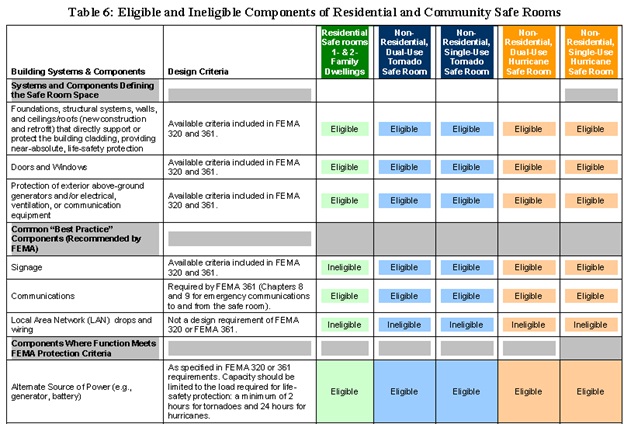
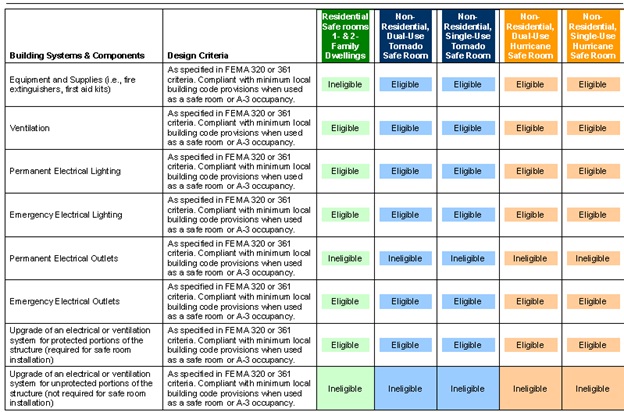
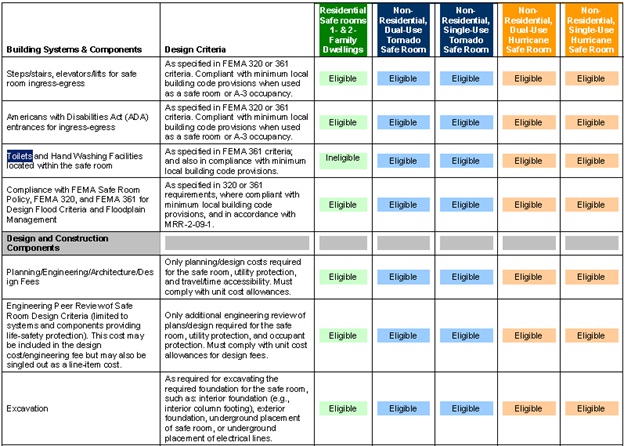
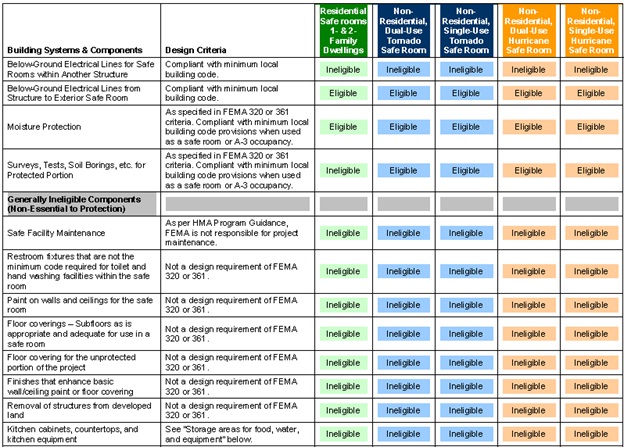
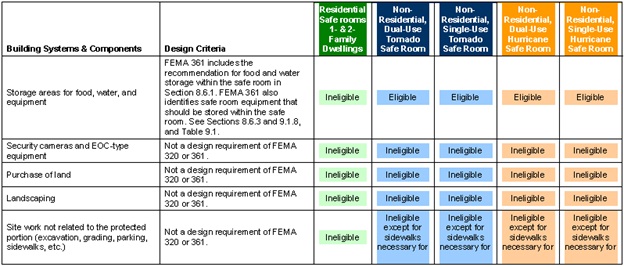
Does FEMA approve, endorse, or certify any products?
No. Federal No. Federal policy does not allow FEMA to approve, endorse, certify, or recommend any products. While a product may be in compliance with FEMA design guidance, any language from manufacturers stating their product is "FEMA approved" or "FEMA certified" is incorrect.
What is the recommended square footage per person for a residential tornado and hurricane safe room?
For residential safe rooms, the usable tornado safe room floor area should be the gross floor area minus the area of sanitary facilities, if any, and should include the protected occupant area between the safe room walls at the height of any fixed seating, if it exists. The minimum recommended safe room floor area per occupant for residential tornado and hurricane safe rooms is provided in table below. (Click the table to view it larger.)

What is the cost of installing a safe room in a new home or small business?
Costs for construction vary across the United States. The cost for constructing a safe room that can double as a master closet, bathroom, or utility room inside a new home or small business ranges from approximately $6,600 to $8,700 (in 2011 dollars). This cost range is applicable to the basic designs in FEMA P-320 (FEMA, 2008a) for an 8-foot by 8-foot safe room (approximately 64 square feet of protected space). Larger, more refined designs for greater comfort cost more, with 14 foot by 14-foot safe rooms ranging in cost from approximately $12,000 to $14,300. The cost of the safe room can vary significantly, depending on the following factors:
- The size of the safe room
- The location of the safe room within the home or small business
- The number of exterior home walls used in the construction of the safe room
- The type of door used
- The type of foundation on which the safe room is constructed
- The location of the home or small business within the United States
For additional cost information for small safe rooms in a home or small business, see FEMA P-320 (FEMA, 2008a), Section II, page 34.
As a homeowner, can I build the safe room on my own?
A homeowner who builds a safe room should be skilled in building construction. Some pre-fabricated safe rooms are available that require less building construction experience to successfully install. In purchasing any safe room, the homeowner should obtain sufficient documentation to determine that the safe room is built to the FEMA safe room design and protection criteria.
Can I install a safe room in an existing home?
Yes, though installing a safe room in an existing home or small business is typically more expensive and challenging than installing one in a new building. Modifying the walls or foundation of an existing building for the construction of a safe room is more complicated than constructing those elements new and, as a result, some of the prescriptive safe room designs provided in FEMA P-320 (FEMA, 2008a) are not practical for some existing homes. Typically, installing a safe room in an existing home costs 20 percent more than installing the same safe room in a new home under construction.
Due to the technical challenges involved in retrofitting an existing home for a safe room,
an architect or engineer should be consulted to address the structural issues and the wind-borne debris protection criteria, even when not required by the local building department. As such, homeowners must balance the desire to have protection within their home with the practicality of constructing a safe room outside the footprint of their existing home or structure for less money. For more information on retrofitting existing buildings with a safe room, see FEMA P-320 (FEMA, 2008a), Section II, page 25.
Is an underground safe room safer than one above ground?
As long as a safe room is designed to meet or exceed the criteria in FEMA P-320 (FEMA, 2008a) and FEMA P-361 (FEMA, 2008b), it will offer the same near-absolute protection whether it is above or below ground.
Where is the best location for the safe room?
There are several possible locations in or near your home or small business for a safe room. The most convenient location in many homes is in the basement. If there is no basement within the home, or if the walls of the basement do not meet FEMA P-320 (FEMA, 2008a) design criteria, an in-ground safe room can be installed beneath a concrete slab-on-grade foundation or concrete garage floor. In-ground and basement safe rooms provide the highest level of protection against missiles and falling debris because they are typically shielded from direct forces of wind and debris; however,
above-ground designs, such as the prescriptive designs provided in FEMA P-320 (FEMA, 2008a) or any solution following the criteria set forth in FEMA P-361 (FEMA, 2008b) will provide near-absolute protection.
Many individuals prefer to build within their homes or buildings so they have some level of
protection while attempting to access their safe room. For an existing home or small business, this convenience must be balanced with the challenges of retrofitting the building. For more information on selecting the location of a safe room within your home or small business, see FEMA P-320 (2008a), Section II, page 27.
Are inspections required?
Obtaining proper building permits and inspections is important for all construction. The builder or homeowner should ensure the safe room is built according to the plans in FEMA P-320 (FEMA, 2008a) or to plans that, through testing and engineering, have been determined to meet the safe room design criteria in FEMA P-320 (FEMA, 2008a) or FEMA P-361 (FEMA, 2008b). The level of construction needed for a safe room typically requires a permit from the local building department. Further, to verify compliance with the FEMA or International Code Council (ICC)-500 (ICC, 2008) criteria, additional quality control inspections for community safe rooms, and often for residential safe rooms, may be needed.
If the Storm shelter costs $6,000.00 can I get more than $2,000 reimbursed?
No, the Hazard Mitigation Program only allows reimbursements up to 75% of the approved costs.
I need to have my Storm Shelter money up front to pay my contractor. Is this possible?
No, The money is only available as a reimbursement, AFTER construction is completed and you have submitted signed and notarized documentation from your contractor stating your Storm Shelter meets or exceeds the specification set forth in FEMA Publication 320.
If I am eligible to receive the $2,000 rebate, do I have to consider that money as income for State and Federal Income Tax purposes?
No, in accordance with the Robert T. Stafford Disaster Relief and Emergency Assistance Act, as amended, these funds are considered free from tax liability under Federally funded assistance programs.
Geographic Information System
Click the button below to access GIS:

Our GIS site is open to the public with three offices currently online.
On the Assessor tab you will be able to view parcels and section information. A photo and sketch of each parcel are also available. If you have any questions about information on the Assessor tab, please call 308-236-1205.
On the Planning/Zoning tab you will be able to see information on floodplains, wellhead protection areas, and county zones. If you have any questions about information on the Planning/Zoning tab, please call 308-236-1998.
GIS Data For Download
You can now download some of our GIS layers below. The data is available in shapefile format only.
Centerline Data (Updated 2015-05-06)
Services
| Assessor |
| Valuation protest information |
| Homestead
exemptions |
| Mobile
home ownership transfer |
| Charitable, religious, and educational tax exemptions |
| |
| Attorney |
| Prosecute cases |
| Collect bad checks |
| Child Support |
| Inheritance tax review |
| |
| Board of Commisioners |
| Board of Commissioners minutes |
| Board of Commissioners agendas |
| Board of Commissioners notices |
| Property tax protests |
| |
| Clerk |
| Marriage
license information |
| Military discharge information |
| Proof
of publications |
| Corporations |
| Partnerships |
| County budget |
| County vendor claims |
| County payroll information |
| School census records |
| Minutes
of the Board of Commissioners meetings |
| Waste hauler permits |
| Tobacco licenses outside city limits |
| |
| District Court |
| Issue
writs and orders |
| Collect
and dispense fees for Child Support |
| Keep
records, books and papers pertaining to court |
| Record
proceedings of court |
| Issue passports |
| |
| Election |
| Voter information |
| Voter registration |
| Absentee voting |
| Absentee ballot |
| Polling places |
| Election calendar |
| Election results |
| Poll worker information |
| |
| Floodplain |
| Issue
floodplain permits for residences or structures |
| |
| Highway |
| County road information |
| County bridge information |
| |
| Public Defender |
| Court appoints to defend someone who can not hire their own
attorney |
| |
| Register of Deeds |
| Mortgages |
| Deeds
of trust |
| Plats |
| Old land records |
|
| Sheriff |
| Enforce laws |
| Preserve
the peace |
| Provide
a safe environment |
| Answer
911 calls and dispatch appropriate authority |
| |
| Surveyor |
| Establish
boundaries |
| Locate lots, plots, parcels, tracts, or division of land |
| Division
may include distance, direction, elevation and acreage |
| Furnish legal descriptions to be used in the platting or subdividing
of land |
| Determine
the amount of acreage in land surveyed |
| Establish
and reestablish corners |
| Topographical
plat |
| |
| Treasurer |
| Tax payment information |
| Drivers license |
| CDL's |
| Learner's permits |
| ID
cards |
| Motor vehicle licenses and registrations |
| Boat registrations |
| Specialty license plate applications |
| |
| Veteran Services |
| Veteran's benefits |
| Military discharge records |
| |
| Weed Control |
| Plant identification |
| Weed control issues |
| Enforcement
of state weed laws |
| |
| Zoning |
|
Approve and issue zoning permits
|
|
Receive applications for zoning variance permits
|
|
Receive applications for change of zoning permits
|
|
Receive applications for special use permits
|
|
Conduct inspections of setbacks and
uses of land
|
Historical Information
Buffalo County is one of only two counties in Nebraska that derived its name from an animal. Years before this area along the Platte River would become a county, large herds of buffalo grazed the river valley and the rolling plains to the north. When it came time to organize the county, it seemed fitting to name it after the animal that once roamed the area freely.
The boundaries of Buffalo County were established by the Territorial Legislature in 1855. The county was officially organized in 1864, three years before Nebraska was admitted in the Union.
Two transportation lines can be credited with the early development of the area -- the Mormon Trail and the Union Pacific Railroad.
The first settlers in this area were said to be Mormons who had headed west along the trail in 1858. But a fierce war between the Cheyenne and Sioux tribes forced these early settlers to temporarily abandon the area. When the fighting subsided, the settlers gradually returned. In time, more and more settlers came to the area because of the rich Platte River Valley and the fertile soil that could be found in the surrounding hills.
With the coming of the railroad in the 1860s, Buffalo County would continue to develop. One of the stations that sprang up was Kearney, the county seat. Originally named Fort Childs, it was later renamed Kearney Junction and finally shortened to Kearney. Moses H. Sydenham, one of the early pioneers in the county, founded a newspaper in this young settlement and used the publication to promote his idea that Kearney, with its central location, should become the capital of the United States.
Hardships such as hot, dry weather and severe blizzards were not uncommon for the early residents of the county. But the most serious challenge faced by those who worked the land was the damage done by waves of grasshoppers that swarmed over the area in the mid 1870s.
More than 115 years later, Buffalo County is a thriving agricultural and industrial area. It also pays an important role in the state's higher education system, with the University of Nebraska at Kearney located in the county seat.
The Buffalo County Courthouse
Virtually every county in Nebraska has had a county seat "fight". Gibbon was designated as the original county seat of Buffalo County, and a courthouse was constructed at that location. In 1874, after considerable agitation for the relocation of the county seat, an election was held, and a majority was cast for the relocation of the county seat at Kearney. The incident which followed the results of that election is often referred to as "stealing the courthouse records." With the results of the election already in, the County Clerk, Joseph Scott, and his deputy, F.G. Keens, loaded the county records in a farm wagon, considerably after normal business hours and arrived in Kearney about 2:00 a.m. Mr. Keens stood guard over the records for the rest of the night. The Union Pacific Railroad donated a site for a new courthouse, and built a frame building which was not occupied until January of 1886. This building served as the Buffalo County Courthouse until a new county courthouse was built and completed in 1890. The frame courthouse was then moved to a new location on First Avenue and served first as a WCTU hospital and later as a home for the Veterans of Foreign Wars.
Contact Us
Board of Commissioners
PO Box 1270
1512 Central Ave
Kearney, NE 68848-1270
Phone: 308-236-1224
Fax: 308-233-3649
E-mail: board@buffalocounty.ne.gov
Courthouse hours are 8:00 a.m. - 5:00 p.m. Monday through
Friday except certain holidays. Drivers License Examiner is
only open until 4:30 p.m. Please call (308) 236-1250 for additional
information.
Emergency Food & Water Supply
If a tornado, ice storm, winter storm or other disaster ever strikes your community, you might not have access to food, water and electricity for days. By taking a little time now to store emergency food and water supplies, you can provide for your entire family.
WATER: THE ABSOLUTE NECESSITY
Stocking water reserves should be among your top priorities in preparing for an emergency. You should store at least a three-day supply of water for each member of your family. Everyone's needs will differ, depending upon age, physical condition, activity, diet and time of year. A normally
active person needs to drink at least two quarts of water each day, but the heat of summer can cause a person to need double that amount. Children, nursing mothers and ill people will also need more. You will need additional water for food
preparation and hygiene, so it is recommended that you store a total of at least one gallon per person, per day.
How To Store Emergency Water Supplies
You can store your water in thoroughly washed plastic, glass,
fiberglass or enamel-lined metal containers. Never use a container that has held toxic substances, because tiny amounts may remain in the container's pores. Sound plastic containers, such as soft drink bottles, are best.
Before storing your water, treat it with a preservative, such as chlorine bleach, to prevent the growth of microorganisms. Use liquid bleach that contains 5.25 percent sodium hypochlorite and no soap. Add four drops of bleach per quart of water (or
two scant teaspoons per 10 gallons), and stir. Seal your water containers tightly, label them and store them in a cool, dark place.
Another method to store water is to simply purchase bottled water and leave the seals intact, but remember to rotate your water every six months or as date stamped on the bottles.
Hidden Water Sources in Your Home
If a disaster catches you without a stored supply of clean water,
you can use water in your hot-water tank, in your plumbing and in ice cubes. As a last resort, you can use water in the reservoir tank of your toilet (not the bowl), but purify it
first (described later).
Water beds hold up to 400 gallons, but some water beds contain toxic chemicals that are not fully removed by many purifiers. If you designate a water bed in your home as an emergency resource, drain it yearly and refill it with fresh water containing two ounces of bleach per 120 gallons.
To use the water in your pipes, let air into the plumbing by turning on the highest faucet in your house and draining the water from the lowest one.
To use the water in your hot-water tank, be sure the electricity or gas is off, and open the drain at the bottom of the tank. Start the water flowing by turning off the water intake valve and turning on a hot-water faucet. Do not turn on the gas or electricity when the tank is empty.
Do you know the location of your incoming water valve? You'll need to shut if off to stop contaminated water from entering your home if you hear reports of broken water or sewage lines.
Family Disaster Supply Kit
It's 2:00 a.m. and a railroad derailment has caused officials to order an evacuation of half of the community. There's no time to gather food from the kitchen, fill bottles with water, grab a first-aid kit from the closet and snatch a flashlight and a portable radio from the bedroom. You need to have these items packed and ready in one place before disaster hits.
Pack at least a three-day supply of food and water, and store it in a handy place. Choose foods that are easy to carry, nutritious and ready-to-eat. In addition, pack these emergency items:
- Medical
supplies and first aid manual
- Hygiene
supplies
- Portable
radio, flashlights and extra batteries
- Shovel
and other useful tools
- Money
and matches in a waterproof container
- Fire
extinguisher
- Blanket
and extra clothing
- Infant
and small children's needs (if appropriate)
FOOD: PREPARING AN EMERGENCY STOCKPILE
If activity is reduced, healthy people can survive on half their usual food intake for an extended period and without any food for many days. Food, unlike water, may be rationed safely, except for children and pregnant women.
If your water supply is limited, try to avoid foods that are high in fat and protein, and don't stock salty foods, since they will make you thirsty. Try to eat salt-free crackers, whole grain cereals and canned foods with high liquid content.
You don't need to go out and buy unfamiliar foods to prepare an emergency food supply. You can use the canned foods, dry mixes and other staples on your cupboard shelves. In fact, familiar foods are important. They can lift morale and give a feeling
of security in time of stress. Also, canned foods won't require cooking, water or special preparation. The following are recommended short-term and long-term food storage plans.
Storage Tips
- Keep
food in the driest and coolest spot in the house, a dark area if possible.
- Keep
food covered at all times.
- Open
food boxes or cans carefully so that you can close them tightly after each use.
- Wrap
cookies and crackers in plastic bags, and keep them in tight containers.
- Empty
opened packages of sugar, dried fruits and nuts into screw-top jars or air-tight cans to protect them from pests.
- Inspect
all food containers for signs of spoilage before use.
Short-Term Food Supplies
Even though it is unlikely that an emergency would cut off your food supply for a week, you should prepare a supply that will last that long. A supply that will last for a week can relieve a great deal of inconvenience and uncertainty until services are restored.
The easiest way to develop a stockpile is to increase the amount of basic foods you normally keep on your shelves. Remember to compensate for the amount you eat from other sources (such as restaurants) during an average week.
You may already have a supply of food on hand that will last for a week. Keeping it fresh is simple. Just rotate your supply once or twice a year.
Special Considerations to Keep in Mind
As you stock food, take into account your family's unique needs and tastes. Try to include foods that they will enjoy and that are also high in calories and nutrition. Foods that require no refrigeration, preparation or cooking are best.
Individuals with special diets and allergies will need particular attention, as will babies, toddlers and the elderly. Nursing mothers may need liquid formula, in case they are unable to nurse. Canned dietetic foods, juices and soups may be helpful for the ill or elderly.
Make sure you have a can opener and disposable utensils. And don't forget nonperishable foods for your pets.
How to Store Your Short-Term Stockpile
Keep canned foods in a dry place where the temperature is fairly cool--not above 70 degrees Fahrenheit and not below freezing.
Rotate your food supply. Use foods before they go bad, and replace
them with fresh supplies, dated with ink or marker. Place new items at the back of the storage area and older ones in front.
How to Cook if the Power Goes Out
For emergency cooking you can use your propane or charcoal grill or camp stove outdoors only. Canned food can be eaten right out of the can. If you heat it in the can, be sure to open the can and remove the label first.
Nutrition Tips
In a crisis, it will be vital that you maintain your strength. So remember:
- Eat at least one well-balanced meal each day.
- Drink enough liquid to enable your body to function properly (two quarts a day).
- Take in enough calories to enable you to do any necessary work.
Links & Resources for Veterans
[Note: All external links will open in a new browser window]
Poll Worker Information
Have you ever considered serving as a poll worker?
If you have the following qualifications you would make an excellent poll worker!
P atriotic 
O rganized
L aw-abiding
L iterate
W illing
O ptimistic
R esponsive
K ind
E nergetic
R esourceful
Every two years the Buffalo County Election Office must appoint an election board to serve in each precinct on Election Day. A poll worker must be a Buffalo County registered voter and able to work on Election Day from approximately 7:00 a.m. to approximately 8:00 - 8:30 p.m. The appointment is for a two-year term and you will be expected to work at every election in that term. If an emergency comes up and you are not able to work, you will need to call the election office to be replaced.
Once appointed, even if you volunteer, poll workers have the same civil leave protection as those who serve on jury duty. Your employer must allow you the time to serve without threat of loss of personal or holiday pay, sick leave, loss of overtime pay, or any other form of penalty for absence from work when serving as an election official.
Should you decide to become a poll worker, you will be expected to attend a training class prior to the next election.
Election Hours - The inspector will inform you of the time you are required to report to the polling place (usually 7:00 a.m.). You may leave as soon as the work is finished after the polls close at 8:00 p.m.
Physical Requirements with or without accommodations
1. Good eye sight and hearing.
2. Able to sit from 8:00 a.m. to 8:00 p.m.
3. Inspectors must be able to lift up to 40 pounds.
Pay Scale - Election judges and clerks are paid $13 per hour and Inspectors are paid $14 per hour. Rural Inspectors picking up and returning election supplies will receive mileage at whatever the current IRS rate is at the time of the election.
Training - A training session is held prior to each Primary and General election. This is held approximately 1 week before the election date and lasts about 1 1/2 to 2 hours. Poll workers will be given a manual at training and paid a set amount of $30 for attending the training. Payment will be made when your check is issued for working the election.
Inspectors - Inspectors are in charge of the polling place election day. They are responsible for supervising board members and informing the election office if any of the board members are not adequately performing their duties. Prior to each election, the Inspectors pick up the supplies, check the polling place, make sure all necessary arrangements are made for election day and call their board members to inform them of election day plans. Election supplies are returned by the inspectors to the Election Office as soon as the polls close.
If you have questions, please contact the Election Commission at 308-236-1233.
Polling Places
 Check the Nebraska VoterCheck Website to access your polling place address and party affiliation. Check the Nebraska VoterCheck Website to access your polling place address and party affiliation.
Click on your polling place below for contact information and a map.
City of Kearney locations
|
|
Rural County locations
|
| Precinct #1 |
Grace Fellowship Church
4305 19th Avenue, Kearney
|
|
Precinct #15 |
Miller Community Hall
322 W Omaha Ave, Miller |
| Precinct #2 |
First Presbyterian Church
4511 6th Ave, Kearney |
|
Precinct #16 |
Pleasanton Community Center
202 N Sycamore, Pleasanton |
| Precinct #3 |
First United Methodist Church
4500 Linden Dr, Kearney
|
|
Precinct #17 |
Ravenna City Auditorium (City and Rural)
301 Alba Ave, Ravenna |
| Precinct #4 |
Good Shepherd Lutheran Church
1208 E 47th St., Kearney
|
|
|
|
| Precinct #5 |
Exhibit Bldg @ Fairgrounds
3807 N Ave
Kearney NE 68847
|
|
Precinct #19 |
Amherst Community Center
110 N Main St, Amherst |
| Precinct #6 |
First Baptist Church
3610 6th Ave, Kearney
|
|
Precinct #20 |
Prince of Peace Catholic Church
2407 W 56th St, Kearney |
| Precinct #7 |
Activity Center at Harmon Park
3100 5th Ave, Kearney
|
|
Precinct #21 |
Colony Acres Community Room
413 1st Street, Gibbon |
| Precinct #8 |
St. James Catholic Church
3801 Ave A, Kearney
|
|
Precinct #22 |
Faith United Church
203 Garfield St, Gibbon |
| Precinct #9 |
First Lutheran Church
3315 Ave G, Kearney
|
|
Precinct #24 |
Shelton Municipal Building
219 C St, Shelton |
| Precinct #10 |
Exhibit Bldg @ Fairgrounds
3807 N Ave
Kearney NE 68847
|
|
Precinct #25 |
Elm Creek Village Center
535 W Boyd Ave, Elm Creek |
| Precinct #11 |
Meadowlark Manor
2110 30th Ave, Kearney
|
|
Precinct #26 |
Spirit of Life Church
3148 Dove Hill Ave, Kearney |
| Precinct #12 |
Activity Center at Harmon Park
3100 5th Ave, Kearney
|
|
Precinct #27 |
Cornerstone Berean Church
1004 30th Ave, Kearney |
| Precinct #13 |
Peterson Senior Activities Center
2020 W 11th St, Kearney
|
|
Precinct #28 |
Riverdale Community Center
221 3rd Ave, Riverdale |
|
Precinct #14
|
American Legion/Bingo Hall
1223 Central Ave, Kearney
|
|
Precinct #29 |
Extension Bldg-Bison Mtg Room
1400 E 34th St, Kearney
|
| Precinct #23 |
American Legion/Bingo Hall
1223 Central Ave, Kearney
|
|
|
|
| |
|
|
|
|
| |
|
|
|
|
Return to: Election Commission Homepage
Shelter in Place
What is Shelter-in-Place?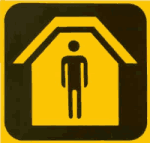
In a situation where a serious hazardous chemical spill has quickly caused a toxic atmosphere, it may be more dangerous to go through those toxic vapors or to attempt to outrun them than to stay in an existing structure. Shelter-in-Place means to get to the inside of a building and remain there during a chemical emergency rather than attempting to evacuate the area. Shelter-in-Place is a viable option for protection against exposure to potentially dangerous airborne chemicals during an emergency.
Why Should I Shelter-in-Place?
During a hazardous materials incident, the idea is to keep everyone's exposure to any chemical as low as possible. It is best to get out of the area and have no exposure, but in a sudden chemical release there may not be time to safely evacuate. In such cases, attempts to evacuate could place you at greater risk of exposure than if you had stayed in your home or workplace. Shelter-in-place is used when there has been a serious hazardous chemical spill that has quickly caused a toxic atmosphere and there is not enough time to safely leave the area. When you shelter-in-place, you take protective action in a structure to reduce exposure to toxic chemical levels. So, unless otherwise instructed to evacuate, sheltering-in-place could be the best way to safely wait out a hazardous chemical release.
How safe is it to Shelter-in-Place?
In a 2001 report by The National Institute for Chemical Studies, several studies were cited that demonstrate the value of sheltering-in-place during a chemical emergency. In older homes, the average house was found to change its air at a rate of less than 1/3
change per hour. It was also found that if one room in the house was sealed up with duct tape and plastic, the amount of chemical that was in the room after one hour was between 1/7 to 1/17 of what was outside. Another study found that sealing up a house also filtered out some of the chemicals. Not only did a sealed up house limit the amount of air coming into a house, the walls actually did some filtering of the air that seeped in. Sheltering-in-place cannot completely eliminate all exposure to the chemical, but it can keep the exposure below dangerous levels.
The report concluded: "For the vast majority of events that have led to the public to shelter-in-place, there have been no reported injuries. In fact, for a very few cases, clouds of toxic materials of sufficient concentration to cause harm have entered communities and, because sheltering-in-place has been accepted by the community and was successfully implemented, no one was injured. The body of evidence suggests that
if there is insufficient time to complete an evacuation, or the chemical leak will be of limited duration, or conditions would make an evacuation more risky than staying in place,
sheltering-in-place is a good way to protect the public during chemical emergencies."
When should I Shelter-in-Place?
A hazardous materials accident can occur anywhere. There may even be a time when you are close to where a chemical accident has taken place. If you feel or hear a strange sound like an explosion; if you see a strange cloud; if you smell a strange odor; if you feel nauseous or have burning or tearing eyes; trust your senses, don't wait for a warning confirmation and act immediately. If it is obvious that you can safely evacuate the area, do so, but remember shelter-in-place as the next option.
In Buffalo County Monitor:
|
KGFW/KQKY
|
1340 AM
|
105.9 FM
|
|
KKPR
|
1460 AM
|
98.9 FM
|
|
KHGI-TV (NTV)
|
|
Channel 13
|
|
NOAA weather radio
|
|
162.475
|
If there is a chemical release in Buffalo County, the emergency alert system will be utilized. The outdoor warning sirens will sound to alert the public to turn on a radio or television for further emergency information.
Where do I Shelter-in-Place?
If you are told to shelter-in-place or if you believe you need to, you should go inside any building close by immediately. If you are not by your own house, a church, school, or store are good options. If you are not near any buildings, your car is a better choice than staying outside. Your home is the best choice to shelter-in-place because you will know
where tapes, towels, plastics and other items are located to help you create your shelter space.
How do I Shelter-in-Place?
- Close all doors to the outside and close and lock all windows (windows sometimes seal better when locked.)
- Ventilation systems should be turned off so no outside air is drawn into the structure.
- Turn off all heating systems and all air-conditioners and switch inlets to the "closed" position.
- Seal any gaps around window type air-conditioners with tape and plastic sheeting, wax paper, or aluminum wrap.
- Turn off all the exhaust fans in kitchens, bathrooms and attics, and cover the openings with plastic wrap or plastic sheeting.
- Close all fireplace dampers and seal with plastic if possible.
- Close as many internal doors as possible in the structure you are in.
- Pick a room on the highest level of the structure, as most of the chemicals that are of concern are heavier than air and will settle in the basement.
- Select a room in the building that is comfortable and easy to seal off. The room should, if possible, provide access to water, toilet facilities, and have adequate room for people and pets to sit.
- If the vapor begins to bother you place a wet cloth over your nose and mouth. For a higher degree of protection, go into the bathroom, close the door and turn on the shower in a strong spray to "wash" the air. Seal any opening to the outside of the bathroom as best you can.
- Make sure you have a battery-powered radio and a flashlight in case the power goes out.
- Once in the room, seal windows, air vents, and exhaust fans with plastic sheeting and duct tape.
- In some homes, light switches and electrical outlets on outside walls are sources of air infiltration and should also be sealed with duct tape and plastic.
- Lastly, seal around the door with duct tape. If the space under the door is too big to seal with tape, try stuffing a damp towel under the door.
- Continue to listen to the radio or TV for emergency information and updates on the incident.
- Don't call 911 unless you have an emergency like a fire or a serious injury.
- Keep your phone available in case someone needs to contact you.
What if I can't make it to a building?
If you can get to your car, go there. Turn off the ventilation system, close your windows and vents, and tune your radio to a local station. If you are driving, try to avoid driving
through a vapor cloud and try to drive crosswind. If you are in a chemical cloud, be aware that your car may stall. If your car stalls or was not running when enveloped by the cloud, DO NOT try to start it unless told to do so by a public announcement on the radio.
If you are outside and not close to a building, such as being on a golf course or in a rural area, try to move crosswind. The vapors may drift downwind for miles and unless there is no wind at all you will not be able to outrun them. Going perpendicular to the wind, away from the center of the cloud will get you to a less harmful atmosphere quicker.
How will I know when it is safe to come out?
As soon as it is deemed safe, authorities will tell you it is safe to leave your building.
Disaster Supplies to have on hand:
- Flashlight and extra batteries
- Portable battery-operated radio
- Duct tape and plastic sheeting & wrap
- Games and toys to occupy children
- First aid kit and essential medicines
- Emergency food and water
SPECIAL NOTE: SHELTER-IN-PLACE DOES NOT APPLY TO FLAMMABLE GASES SUCH AS PROPANE AND NATURAL GASES.
Voter Registration
Nebraska VoterCheck Website
Click the above link to access your polling place address and party affiliation if you are already registered
Nebraska Online Voter Registration
Click the above link to register to vote, change your address, party affiliation or change your name on your voter registration record.
Is registration required in Nebraska to be eligible to vote?
Yes, the only exception is during Presidential elections. If you have recently moved to Nebraska or moved to another state after the registration deadline, then you may only vote a Presidential ballot.
Who may register to vote?
Anyone who meets the following criteria:
- Will be 18 years of age or older on General Election Day (first Tuesday after the first Monday in November)
- Is a United States Citizen
- Is a resident of Nebraska
- Has not been convicted of a felony or, if convicted it has been at least two years since I completed my sentence for the felony, including any parole term
- Have not been found mentally incompetent
How may I register?
You may register at the Election Commissioner's Office from 8:00 a.m. to 5:00 p.m. Monday through Friday. You may also download the form and send it by mail if you
have access to a printer (see instructions on the right) or click on the link above
that says Nebraska Online Voter Registration.
What is the registration deadline?
Mail-in registration must be postmarked on or before the third Friday before an election. You may register in person at the Election Commission by the second Friday prior to an election.
Do I have to be a resident for a certain time period?
No, you may register the same day you become a resident of Buffalo County.
How is residence determined?
Residence shall mean:
- That place in which a person is actually domiciled, which is the residence of an individual or family, with which a person has a settled connection for the determination of his or her civil status or other legal purposes because it is actually or legally his or her permanent and principal home, and to which, whenever he or she is absent, has the intention of returning.
- The place where a person has his or her family domiciled even if he or she does business in another place.
- If a person is homeless, the county in which the person is living.
No person serving in the armed forces of the United States shall be deemed to have a residence in Nebraska because of being stationed in Nebraska. Those serving in the military or attending college in another area other than Buffalo County do not need to change their registration. However, any permanent change in your residence or address will require you to re-register to vote in that location.
May a student register and vote from a school address?
Yes, you may decide to register and vote from either your school or home address. If you want to vote from your home address, write your county election commissioner or clerk and ask them to mail a voter registration form and an absentee ballot. (See Absentee Ballot information)
Must I designate a party affiliation on my registration?
Yes. Nebraska has a "closed primary" which means that you are only allowed to vote the ballot for the party you designated on your voter registration. Currently Nebraska has Republican, Democrat, Libertarian, Non-partisan, and Marijuana NOW. If you are registered as one of the above parties, you would receive the party ballot along with the non-partisan ballot. You may indicate that you wish to be Non Partisan, but in that event, you would only receive the non-political ballot and (if you request) a congressional and senatorial partisan ballot. You may change your party affiliation anytime before the registration deadline.
Do I ever have to re-register?
You must re-register whenever you change your name, your address or political party affiliation.
Will I receive notice that my mail-in registration has been accepted and processed?
Yes, if you completed the form correctly and mailed it by the deadline (third Friday prior to an election). If you do not receive notification within 10 days that your registration has been accepted, call the Election Office. You are not a registered voter until you receive confirmation.
Winter Weather Preparedness
Each year, the National Weather Service issues numerous watches, warnings and advisories. Knowledge of those products is a critical element in winter weather preparations.
- Winter Storm Watch - Adverse winter weather (heavy snow, blizzard) is expected within the next two days, but the exact timing, location or occurrence of the storm is still uncertain. This is the time to get prepared for the storm.

- Winter Storm Warning - Hazardous winter weather is likely. If not already occurring, it is expected to occur within 6 to 24 hours. Travel will be hazardous, if not impossible. You should be ready for the storm by this time. Stay indoors!
- Blizzard Warning - The most dangerous of all winter weather will occur in your area. A combination of winds 35 mph or greater and significant snow and/or blowing snow with visibilities less than ¼ mile for three or more hours is expected in the warning area. Blinding snow ("white out"), deep drifts and life threatening wind chill will occur. Travel will be dangerous and should not be attempted. You should seek refuge immediately!
- Winter Weather Advisory - Winter weather conditions are expected to cause significant inconveniences and may be hazardous. If caution is exercised, these situations should not become life threatening. The greatest hazard is often to motorists.
Things to do at home or work BEFORE a winter storm strikes...
Primary concerns are the potential loss of heat, power, telephone service, and a shortage of supplies if storm conditions continue for more than a day.
Have available:
- Flashlight(s) and extra batteries.
- Battery-powered Weather Radio and portable radio. These are used to receive emergency information. They may be your only link to the outside.
- Extra food and water. High-energy food, such as dried fruit or candy, and food requiring no cooking or refrigeration is best.
- Extra medicine and baby items.
- First-aid supplies.
- Emergency heating source, such as a fireplace, wood stove, space heater, etc. Make sure you know how to uses the heating sources to prevent a fire and make sure you have proper ventilation.
- Fire extinguisher and smoke detector. Test units regularly
to ensure they are working properly. Replace batteries the same weekend as the time change occurs in the spring (daylight-savings time) and fall (standard time).
On the farm....
- Move animals to sheltered areas. Shelter-belts, properly laid out and oriented, are better protection for cattle than confining shelters, such as sheds.
- Haul extra feed to nearby feeding areas.
- Have a water supply available. Most animal deaths in winter storms are from dehydration.
- Heating fuel. Fuel carriers may not reach you for days after a severe winter storm. Stay alert to changing weather conditions throughout the winter to maintain an adequate fuel supply in advance of severe weather moving into the area.
WINTER PRECIPITATION TERMS:
Snow
- Flurries - Light snow falling for short durations. No accumulation or light dusting is all that is expected.
- Showers - Snow falling at varying intensities for brief periods of time. Some accumulation is possible.
- Squalls - Brief, intense show showers accompanied by strong, gusty winds. Accumulation may be significant. Snow squalls are best known in the Great Lakes region.
- Blowing Snow - Wind-driven snow that reduces visibility and causes significant drifting. Blowing snow may be snow that is falling and/or loose snow on the ground picked up by the wind.
- Blizzard - Winds over 35 mph with snow and blowing snow reducing visibility to near zero.
Sleet
Is formed by raindrops that freeze into ice pellets before reaching the ground. Sleet usually bounces when hitting a surface and does not stick to objects. However, it can accumulate like snow and cause a hazard to motorists.
Freezing Rain
Is rain that falls onto a surface that has a temperature below freezing. This causes it to freeze to surfaces, such as trees, cars, and roads, forming a coating or glaze of ice. Even small accumulations of ice can cause a significant hazard.
Wind Chill
The wind chill is based on the rate of heat loss from exposed skin caused by combined effects of wind and cold. As the wind increases, heat is carried away from the body at an accelerated rate, driving down the body temperature. Animals are also affected by wind chill.
WINTER DRIVING
The leading cause of death during winter storms is transportation accidents. Preparing your vehicle for the winter season and knowing how to react if stranded or lost on the road are the keys to safe winter driving.
Have a mechanic check the following items on your car:
- Battery

- Antifreeze
- Wipers and windshield washer fluid
- Ignition system
- Thermostat
- Lights
- Flashing hazard lights
- Exhaust system
- Heater
- Brakes
- Defroster
- Oil level (if necessary, replace existing oil with a winter grade oil or the SAE 10w/30 weight variety)
- Install good winter tires. Make sure the tires have adequate tread. All-weather radials are usually adequate for most winter conditions.
- Keep a windshield scraper and small broom for ice and snow
removal.
- Maintain at least a half tank of gas during the winter season.
- Plan long trips carefully. Listen to the radio or Call 511 from anywhere in Nebraska for Nebraska Traveler information for the latest road conditions. Always travel during daylight and, if possible, try not to travel alone.
- Let someone know your timetable and primary and alternate
routes.
- Dress to fit the season. Wear loose-fitting, light-weight, warm clothing in several layers. Trapped air insulates. Layers can be removed to avoid perspiration and subsequent chill. Outer garments should be tightly woven, water repellent and hooded. Wear a hat. Half your body heat loss can be from the head. Cover your mouth to protect your lungs from extreme cold. Mittens, snug at the wrist, are better than gloves. Try to stay dry.
- Carry food and water. Store a supply of high-energy "munchies" and several bottles of water.
Carry a WINTER STORM SURVIVAL KIT in your vehicle that includes:
- Flashlights with extra batteries
- First aid kit with pocket knife
- Necessary medications
- Several blankets
- Sleeping bags
- Extra newspapers for insulation
- Plastic bags (for sanitation)
- Matches
- Extra set of mittens, socks, and a wool cap
- Rain gear and extra clothes
- Small shovel
- Small sack of sand for generating traction under wheels
- Small tools (pliers, wrench, screwdriver)
- Booster cables
- Set of tire chains or traction mats
- Cards, games, and puzzles
- Brightly colored cloth for a flag
- Canned fruit and nuts
- Non-electric can opener
- Bottled water
IF TRAPPED IN CAR DURING A BLIZZARD:
- Stay in the car. Do not leave the car to search for assistance unless help is visible within 100 yards. You may become disoriented and lost in blowing and drifting snow.
- Display a trouble sign. Hang a brightly colored cloth on the radio antenna and raise the car hood.
- Occasionally run engine to keep warm. Turn on the car's engine for about 10 minutes each hour. Run the heater when the car is running. Also, turn on the car's dome light when the car is running. Beware of carbon monoxide poisoning. Keep the exhaust pipe clear of snow and open a downwind
window slightly for ventilation.
- Watch for signs of frostbite and hypothermia.
- Do minor exercises to keep up circulation. Clap hands and move arms and legs occasionally. Try not to stay in one position for too long.
- If more than one person is in the car, take turns sleeping.
- For warmth, huddle together. Use newspapers, maps, and even the removable car mats for added insulation.
- Avoid overexertion. Cold weather puts an added strain on the heart. Unaccustomed exercise such as shoveling snow or pushing a car can bring on a heart attack or make other medical conditions worse. Be aware of symptoms of dehydration.
Land Patents 'D'
State of Nebraska - Alphabetical Index of Buffalo County Land Patents
Compiled by the Buffalo County Register of Deeds
Land Patents 'D'
|
LAND PATENT HOLDER
|
DEED BOOK
& PAGE
|
LEGAL DESCRIPTION
|
|
Dahlke, William
|
55-238
|
W1/2 E1/4 6-11-17
|
|
Dailard, Walter D.
|
72-609
|
LOT 8 17-8-14
|
|
Dailard, Walter D.
|
72-609
|
LOTS 5 & 8 & SW1/4 SE1/4 18-8-14
|
|
Daniels, George
|
G-201
|
SW1/4 14-10-14
|
|
Danner, John A.
|
G-131
|
LOTS 1 & 2 30-9-14
|
|
Darby, John H.
|
G-10
|
S1/2 NW1/4 & N1/2 SW1/4 8-9-13
|
|
Darling, Charles E.
|
N-184
|
NE1/4 8-8-13
|
|
Dart, Franklin W.
|
61-491
|
LOTS 6 & 7 6-8-16
|
|
Darwin, John
|
G-410
|
LOTS 4-5-8&9 18-10-16
|
|
Daudt, Johann G.
|
62-602
|
N1/2 NE1/4 10-10-13
|
|
Daul, John
|
42-112
|
LOTS 5 THRU 8 INCL 4-8-18
|
|
Daugherty, John M.
|
92-306
|
NW1/4 NW1/4 14-12-18
|
|
Daugherty, John M.
|
50-299
|
NE1/4 22-12-18
|
|
Davenport, Asa A.
|
G-277
|
NE1/4 10-10-18
|
|
Davenport, Charles W.
|
G-72
|
W1/2 SW1/4 20-10-13
|
|
Davidson, Charles N.
|
46-157
|
NE1/4 6-12-14
|
|
Davidson, John K.
|
55-115
|
SE1/4 20-10-18
|
|
Davis, Charles
|
K-296
|
SE1/4 NE1/4 & S1/2 SE1/4 & NE1/4 SE1/4 28-9-18
|
|
Davis, Douice R. heirs
|
G-172
|
S1/2 NW1/4 10-9-14
|
|
Davis, John
|
55-153
|
LOTS 5-6-7&8 12-8-17
|
|
Davis, Lucy E.
|
G-464
|
NW1/4 24-10-14
|
|
Davis, Terry E.
|
32-24
|
N1/2 NW1/4 10-9-14
|
|
Davis, Thomas M.
|
129-562
|
NW1/4 20-12-15
|
|
Davison, Amanda
|
D-265
|
NW1/4 20-10-16
|
|
Day, George W.
|
G-395
|
E1/2 NE1/4 2-10-16
|
|
Day, Usher A.
|
B-504
|
NE1/4 14-9-14
|
|
Day, Usher A.
|
55-59
|
W1/2 NW1/4 34-10-14
|
|
Dean, Joanna
|
G-119
|
NW1/4 34-11-13
|
|
Dean, Jacob
|
50-489
|
N1/2 SW1/4 24-10-13
|
|
Decker, Henry heirs
|
G-363
|
SE1/4 34-11-13
|
|
Decker, John W.
|
G-239
|
NE1/4 2-11-15
|
|
Decker, Reuben
|
G-392
|
W1/2 SW1/4 18-9-18
|
|
Decker, William J.
|
G-472
|
W1/2 E1/2 18-9-18
|
|
DeClark, Isaac
|
G-210
|
NE1/4 2-10-14
|
|
Defields, Lorenzo
|
55-18
|
N1/2 SE1/4 22-10-17
|
|
Dehm, George L.
|
Z-249
|
S1/2 SE1/4 & NW1/4 NW1/4 7-12-17 recpt
|
|
Dehm, George L.
|
42-275
|
E1/2 NE1/4 18-12-17
|
|
Dehm, John M.
|
G-412
|
SE1/4 9-12-17
|
|
Dehm, Margaret B.
|
55-122
|
SE1/4 NE1/4 & E1/2 SE1/4 & SW1/4 SE1/4 4-12-17
|
|
De La Barre, Reamor R.
|
31-393
|
SW1/4 24-11-18
|
|
Demaray, Alonzo
|
G-331
|
W1/2 NW1/4 & N1/2 SW1/4 26-12-14
|
|
Demary, Danforth heirs
|
G-423
|
N1/2 N1/2 8-12-13
|
|
Demary, Danforth heirs
|
G-355
|
NW1/4 30-12-13
|
|
Demary, Henry A.
|
55-96
|
N1/2 S1/2 8-12-13
|
|
Dempster, William H.
|
G-321
|
SE1/4 20-12-14
|
|
Demuth, John
|
46-522
|
NW1/4 10-9-18
|
|
Dennuth, John
|
G-373
|
NE1/4 10-9-18
|
|
Derryberry, John H.
|
55-143
|
NE1/4 6-10-18
|
|
Derstine, Isaac G.
|
G-424
|
SW1/4 34-11-16
|
|
Devall, Alpheus W.
|
116-376
|
LOT 7 5-8-13
|
|
Devall, Alpheus W.
|
O-418
|
LOT 8 6-8-13
|
|
Devall, James M.
|
G-187
|
SE1/4 4-10-13
|
|
Devall, William G.
|
145-396
|
SE1/4 24-9-13
|
|
Devaul, Eberhart M.
|
G-156
|
SW1/4 12-12-13
|
|
Dick, Notley
|
G-270
|
SE1/4 15-12-16
|
|
Dickenson, Lewis S.
|
B-48
|
NW1/4 NW1/4 & LOT 1 10-8-16
|
|
Dickmann, George R.
|
55-9
|
E1/2 SW1/4 & W1/2 SE1/4 30-12-17
|
|
Dodge, Freeman C.
|
106-209
|
SE1/4 6-12-13
|
|
Dodge, Harley J.
|
G-462
|
NE1/4 22-12-15
|
|
Donaldson, James E.
|
84-38
|
SE1/4 6-9-17
|
|
Dondono, Louis
|
48-308
|
NE1/4 NW1/4 10-8-14
|
|
LAND PATENT HOLDER
|
DEED BOOK
& PAGE
|
LEGAL DESCRIPTION
|
|
Donner, Fred
|
G-108
|
NW1/4 3-8-13
|
|
Donahoe, Thomas A.
|
T-519
|
SE1/4 13-12-17
|
|
Dooley, Daniel
|
92-267
|
W1/2 NE1/4 28-9-18
|
|
Dooley, Patrick
|
G-380
|
NE1/4 10-11-13
|
|
Dorsey, Daniel A.
|
D-180
|
NE1/4 30-10-16
|
|
Dow, Charles Henry
|
G-381
|
S1/2 NW1/4 30-11-14
|
|
Dow, Charles Henry
|
G-383
|
SW1/4 30-11-14
|
|
Dow, John B.
|
55-172
|
NE1/4 26-12-15
|
|
Dow, Thomas F.
|
G-366
|
SE1/4 24-11-15
|
|
Dow, William S.
|
55-10
|
SE1/4 30-11-14
|
|
Downer, Henry
|
49-384
|
NW1/4 2-9-17
|
|
Downing, Wallce A.
|
B-488
|
N1/2 NW1/4 28-10-16 (warranty deed)
|
|
Downs, William
|
D-27
|
LOTS 3 & 4 12-8-18
|
|
Drake, Jonathan C.
|
G-326
|
SW1/4 20-10-17
|
|
Drury, Deloss
|
G-33
|
E1/2 NW1/4 8-9-14
|
|
Drury, Peter K.
|
55-136
|
NE1/4 8-9-14
|
|
Dudley, Ezra
|
G-470
|
SW1/4 32-11-15
|
|
Duffield, Hattie
|
55-52
|
LOT 7 7-8-17
|
|
Duffield, Hattie
|
55-52
|
LOTS 6-7&8 8-8-17
|
|
Dugdale, George
|
O-222
|
ALL 23-9-13 except SE1/4 SW1/4
|
|
Dugdale, Henry
|
O-206
|
SE1/4 3-9-13
|
|
Duncan, George S.
|
B-534
|
SW1/4 26-10-16
|
|
Duncan, George W.
|
G-353
|
NW1/4 24-11-15
|
|
Dunkerson, James R.
|
50-237
|
LOT 9 & 10 & NW1/4 NW1/4 13-8-14
|
|
Dunn, Charles
|
55-194
|
SE1/4 18-11-17
|
|
Dye, Daniel
|
G-213
|
S1/2 SE1/4 28-10-13
|
|
Dye, Wesley W.
|
55-107
|
LOTS 8 & 9 7-8-14
|
|
Dye, Wesley W.
|
55-107
|
SW1/4 SW1/4 & LOT 5 8-8-14
|
Return to: Register of Deeds Homepage | Land Patents
County Benefits
The Buffalo County Veterans Service Office offers the following benefits for those veterans who are eligible:
County Veterans Aid Fund
The CVA fund is a temporary emergency fund to assist veterans, their spouses, and dependents when there is an unforeseen emergency and there are no other resources available. Eligible veterans are persons who served on active duty, received an Honorable Discharge, and served during one of the defined "wartime eras" and who have resided in Nebraska for at least one year, and Buffalo County for at least six months. Applicants may request assistance with food, shelter, clothing, funeral, medical, dental, and surgical items. The applicant must apply through the County Service Office in Buffalo County. This is an "aid" program so the veteran must demonstrate an "inability" to meet the obligation to pay these bills, via an application.
Bronze Grave Flag Holders
State of Nebraska statute requires the County Veterans Service Office to provide a flag holder reflecting the veterans wartime era. The Buffalo County, Veterans Service Office also annually inventories these flag holders to insure they remains on the correct grave and we replace damaged markers.
Registration of DD214s
Buffalo County records a "certified copy" of the original copy of a veterans military separation document (DD-214). Once recorded the veteran may call us from any where in the world and we will provide them with a "certified copy" when needed.
Homestead Exemption
Annually, the Buffalo County Veterans Service Office obtains a letter from the VA Regional Office that establishes who are eligible veterans (or widows) for a tax exemption on their personal residence. These letters are provided to the County Assessor.
Grave Registration
Upon notification of the burial of a veteran in Buffalo County we complete a "grave registration card". We maintain a copy here in Buffalo County, and the original is sent to the State of Nebraska, Department of Veteran's Affairs in Lincoln. We also order a "Presidential Memorial Certificate" for the family of all deceased Buffalo County veterans.
Planning & Zoning Commission
Office Hours: Monday - Friday: 8:00 a.m. - 5:00 p.m.
2025 Planning and Zoning Commission Deadlines and Meeting Times
2025 Board of Commissioners Deadlines & Meeting Times
Objectives
• Review and recommend, to the County Board, the enactment and amendment of Buffalo County’s Zoning Map, Zoning Code, and Subdivision Code. Also this Commission conducts population, housing, and growth studies of Buffalo County and its rural areas. From this study, the Commission formulates Buffalo County’s Comprehesive Plan. That Plan provides to the Commission and this county a direction as to future growth and development for Buffalo County’s unincorporated and rural areas, including any Zoning Map or Code Amendments that be needed to pursue the goals of the Comprehensive Plan.
• Analyze and submit recommendations of approval or disapproval, of any applications regarding Subdivisions of any Development-Type Operations and Special Uses as identified in the County’s Zoning Code and Subdivision Code to the Buffalo County Board of Commissioners.
• Public meetings are held on the third Thursday of each month, at 7:00 p.m., at the Buffalo County Courthouse, unless otherwise posted.
|
Note: Government Offices can only accept written documents for filing into official government records unless specific statutory language authorizes filings done by other than written medium.
|
|
Fees:
| Filing |
Fee |
| *Zoning permits |
$100.00 ****** |
| *Conditional/Special Use permits |
$50.00 plus estimated cost of publication |
| *Rezoning |
75.00 plus estimated cost of publication posted at time of filing |
| *Amendments to Comprehensive Plan, Zoning Regulations, Subdivision Regulations and Zoning map |
$75.00 in each instance plus estimated cost of publication posted at time of filing |
| *Variances submitted to Board of Zoning Adjustment |
$100.00 plus estimated cost of publication posted at time of filing |
**Administrative Subdivision Fees for Buffalo County:
| Filing |
Fee |
| Filing with Zoning Administrator |
$300.00 plus estimated cost of publication at time of filing ****** |
Modifications after filing
Plus filing fees set by Register of Deeds |
$150.00 plus estimated cost of publication at time of filing ******
|
| Plus per lot fee of |
$50.00 ****** |
**Non-Administrative Subdivision Fees for Buffalo County:
| Filing |
Fee |
| Preliminary Plat |
$200.00 *** ****** |
| Final Plat (applied each portion if staged) |
$100.00 *** ****** |
| Plus per lot fee of |
$50.00 |
**Other Processes or Events Fees for Buffalo County:
| Filing |
Fee |
| Minor Subdivision Changes |
$100.00 plus estimated cost of publication at time of filing ****** |
| Vacation of Plat or part thereof |
$250.00 plus estimated cost of publication at time of filing
$125.00 plus estimated cost of publication at time of filing for administrative subdivisions ***** |
| Variance |
$100.00 plus estimated cost of publication at time of filing ****** |
| Fee if public hearing postponed |
$50.00 |
| Fee for process if not otherwise stated |
$50.00 |
****Conservation or Preservation Easements Fees for Buffalo County:
| Fee |
| $125.00 or $2.00 per acre, whichever is greater |
Plus filing fees set by Register of Deeds unless Code states otherwise
*Passed at Board of Supervisors meeting on May 28, 2002
**Passed at Board of Supervisors meeting on February 24, 2009
***Passed at Board of Supervisors meeting on September 14, 2010
****Passed at Board of Supervisors meeting on November 23, 2010
*****Passed at Board of Supervisors meeting on June 11, 2013 retroactive to May 14, 2013
******Passed at County Commissioners meeting on April 25, 2017 effective July 1, 2017
Surveyor
County surveyor powers and duties:
(1) It shall be the duty of the county surveyor to make or cause to be made all surveys within his or her county that the county surveyor may be called upon to make and record the same.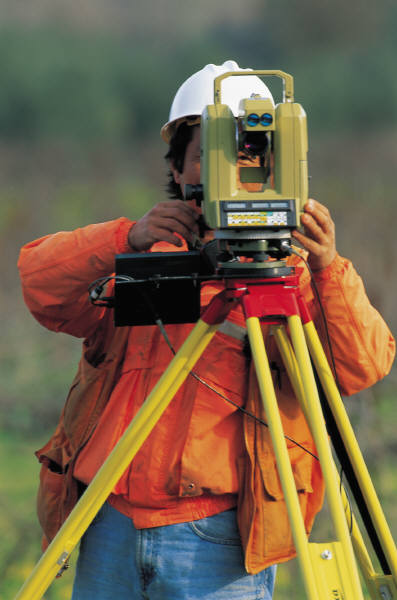
(2) The county surveyor shall prepare and file the required annual inventory statement of county personal property in his or her custody possession as provided in sections 23-346 to 23-350.
Trespass; exemption from liability. The county surveyor in the performance of his official duties, shall not be liable to prosecution for trespass.
Original corners; perpetuation. It shall be the duty of the county surveyor in surveys made by him or her to perpetuate all original corners not at the time well marked, and all corners or angles that he or she may establish or reestablish, in a permanent manner by setting monuments containing ferromagnetic material, according to the instructions of the State Surveyor.
Corners; establishment and restoration; rules governing. The boundaries of the public lands established by the duly appointed government surveyors, when approved by the Surveyor General and accepted by the government, are unchangeable, and the corners established thereon by them shall be held and considered as the true corners which they were intended to represent, and the restoration of lines and corners of said surveys and the division of sections into their legal subdivisions shall be in accordance with the laws of the United States, the circular of instructions of the United States Department of the Interior, Bureau of Land Management, on the restoration of lost and obliterated section corners and quarter corners, and the circular of instructions to the county surveyors by the State Surveyor under authority of the Board of Educational Lands and Funds. The county surveyor is hereby authorized to restore lost and obliterated corners of original surveys and to establish the sub divisional corners of sections in accordance with the provisions of the section and section 23-1907. Any registered land surveyor registered under the provisions of sections 81-8,108 to 81-8,127 is hereby authorized to establish any corner not monumented in the original government surveys in accordance with the provisions of this section 23-1907. Subdivision shall be executed according to the plan indicated by the original field notes and plats of surveys and governed by the original and legally restored corners. The survey of the sub divisional lines of sections in violation of this section shall be absolutely void.
Surveys; records; contents; available to public. The county surveyor shall record all surveys, for permanent purposes, made by him or her, as required by sections 81-8,121 to 81-8,122.02. Such record shall set forth the names of the persons making the application for the survey, for whom the work was done, and a statement showing it to be an official county survey or resurvey. The official records, other plats, and field notes of the county surveyor's office shall be deemed and considered public records. Any agent or authority of the United States, the State Surveyor or any deputy state surveyor of Nebraska, or any surveyor registered pursuant to sections 81-8,108 to 81-8,127, shall at all times, within reasonable office or business hours, have free access to the surveys, field notes, maps, charts, records, and other papers as provided for in sections 23-1901 to 23-1913. In all counties, where no regular office is maintained in the county courthouse for the county surveyor of that county, the county clerk shall be custodian of the official record of surveys and all other permanent records pertaining to the office of county surveyor.
Land surveying. Land surveying shall mean the establishment or reestablishment of corners and the boundaries and the location of lots, parcels, tracts, or divisions of land, which may include distance, direction, elevation, and acreage, and the correct determination and description of lots, parcels, tracts, or divisions of land for, but not limited to, any of the following purposes:
- To furnish a legal description of any tract of land to be used in the preparation of deeds of conveyance when the description is not the same as the one in the deed of conveyance to the current owner or when bearings, distances, or measurements are needed to properly describe the tract being conveyed
- To furnish a legal description of any land surveyed to be used in the platting or subdividing of the land
- To determine the amount of acreage contained in any land surveyed
- To furnish a topographic plat of a lot, parcel, tract, or division of land and locating natural and artificial features in the air, on the surface or subsurface of the earth, and on the beds or surface of bodies of water for the purpose of establishing the facts of size, area, shape, topography, and orientation of improved or unimproved real property and appurtenances to the real property.
Office Hours: Monday - Friday 8:00am-5:00pm
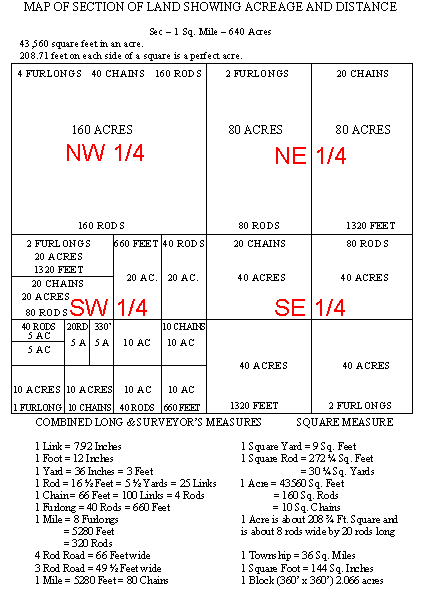
Highway
 View on map View on map
There are approximately 962
square miles in Buffalo
County. Within this area there are 1500 miles of
road: 112.3 miles are County oil or concrete roads. There are 342 bridges over 20 feet in the
County. There are also 242 bridges that
are 20 feet and under which are not considered bridges but are classified as
culverts because of the constricted water flow.

There are 41 full time employees
and during the summer months we employ three to four more people. In addition to the Highway Superintendent,
there are: one assistant Highway Superintendent, two clerical, two foremen, 19
maintainer operators, five heavy equipment operators, one sign man, one welder,
two mechanics, one mechanic assistant and eight truck driver/operators.
We also have a large inventory of
machines and equipment valued at $9,143,598.00. This includes 21 maintainers, one crane, three backhoes, four loaders, 43
pickups and trucks and a considerable number of other pieces of equipment.
We have an excellent
communication system which includes 2-way radios which are used extensively. They save many miles of driving and enable
people to communicate from one corner of the county to the other. They have saved many maintainer men from
having to walk for help after having a flat tire, being stuck in a snowstorm or
any other emergency type situation. Our
foremen also have cellular phones.
We have 2-way radios in all the
maintainers, office, loaders and in a majority of our other equipment. The radios also give us communication with
the Sheriff’s Department an the County
Surveyor. The telephone system gives us easier
communication with the Sheriff’s Department, Surveyor, other County Courthouse
offices and also the City of Kearney
offices by dialing just four digits.

Buffalo County is divided into 26
Townships. We have divided the townships
into Zones 1 through 26. We bid gravel
once a year. The bid period is from
April 1 of one year to March 31 of the following year.
Buffalo County went to the GEO Base Addressing System and signs were installed in 1997. This system makes finding a resident faster in an emergency type situation.
Register of Deeds
Kellie John
Register of Deeds
Office Hours: Monday - Friday 8:00 a.m. to 5:00 p.m.
Location Buffalo County Courthouse - 1512 Central Ave
The Register of Deeds Office is responsible for maintaining and securing the permanent land records of the County. The Register of Deeds is a separate office in counties that have more than 20,000 inhabitants.
The duties include the preservation and recording of the land records. Every document must be proofed, indexed, and all transactions meeting the statutory requirements. This office routinely deals with complex legal descriptions and requires accuracy and detail. Legal documents, such as, but not limited to Deeds, Mortgages, Deed of Trusts, Easements, Subdivision Plats, and any and all documents that affect a specific tract of land in the county. In addition to the Public, this office is utilized by Real Estate Companies, Title and Abstract Companies, Appraisers, Attorneys, and Genealogist.
The Register of Deeds records are available on the Free Public Access computers. All copies and Buffalo County plat books are available to purchase in the office.
For information on Laredo and Tapestry, click on Deeds Records Online, to the left.
Laredo - If you are looking for online access and want a subscription.
Tapestry - You need a copy immediately or are a frequent user, pay with credit card. Get started with Tapestry.
Subdivision List by Subdivision Name
History:
The first courthouse of Buffalo County erected at Gibbon in 1873. History tells us that the Gibbon Courthouse records were placed in a wagon, brought to Kearney at night hidden in the “Chandler Building’ where the Telephone Company is today. (More Buffalo County history)
The first deed recorded in Buffalo County was a 40-acre tract of land in Section 13, Township 9, North, Range 13 West. The date of the recording was February 12, 1870.
Schedule of Recording Fees
| Buffalo County Register of Deeds
|
Term
|
| T.J. Scott
|
January 1894 to January 1898
|
|
David Mathieson
|
January 1898 to January 1902
|
| T. G. Spencer
|
January 1902 to January 1906
|
| V. B. Wheelock
|
January 1906 to January 1915
|
| T. J. Scott
|
January 1915 to January 1927 |
| Lydia Finke
|
January 1927 to January 1935 |
| Mabel Rice
|
January 1935 to January 1959
|
| Sam Spahr
|
January 1959 to January 1975 |
| Margaret Swanson
|
January 1975 to January 1999
|
| Kellie John
|
January 1999 to Current
|
Alphabetical Index of Buffalo County Land Patents Compiled by the Buffalo County Register of Deeds
Schedule of Recording Fees
Filing Fees (New as of January 1, 2013)
LB-14 (Neb.Rev.Stat.33-109)
- 1st page of document: $10.00
- 2nd page & all subsequent pages: $6.00 each
- The above fees pertain to ALL documents filed within the Register of Deeds offices.
Exceptions listed below are "no fee" documents:
- Federal Tax Lien Termination
- State Tax Lien Termination
- UCC Termination
- Relinquishment
- Certified copies: $1.50 per page
- UCC Financings Statements, Assignment, Amendments, Release, Partial Release: Flat Fee $14.00 (Change effective date 7/1/2021) LB 910 passed 7/31/2020
Documentary Tax—Effective September 3, 2025 - Pursuant to NE LB 78 for Nebraska will change to $2.32 per $1,000.
(see the Computation Table) The Nebraska Department of Revenue requires the Register of Deeds office to collect a documentary-stamp tax when a deed is presented for recording
A Form 521 (transfer statement) must be completed for all deeds, memorandum of contracts and/or land contracts.
Copies are $0.50 per page plus $1.00 P&H to mail out
Faxes are $0.50 per page
Money is needed before copies are sent.
Buffalo County Plat & Tam Books-showing ownership - $12.00
The above list of fees are in accordance with LB463 L.S. 1983: Effective August 26, 1983; LB606 L.S. 1985 Effective July 1, 1985; LB1153, Effective January 1, 1991 LB 1022, Effective January 1, 1993; LB1099, Effective July 16, 2004
LB 254 - Provide New Requirements for Instruments recorded in the Office of Register of Deeds Effective August 27, 2011
- Recording Space Requirements:
- 3" X 8 1/2" on top of page 1
- No attachment or affirmation shall be used in any way to cover any information or printed material on the instrument. (For example, nothing may be taped or attached to an instrument.)
- Every instrument presented for recording shall have on the first page BELOW the 3 inch margin a return address and the title of the document
- Margin Requirements: 1" on both vertical sides, and 1" on the bottom. This applies throughout the document.
- Instrument Requirements:
- Paper at least 8 1/2" X 11" , and no larger than 8 1/2" X 14"
- Shall be printed, typewritten or computer generated in black ink, white paper, and a minimum 8pt font
- Must be legible
- Each signature on an instrument shall be in black or dark blue ink
- Names of each party shall be typed, printed, or stamped beneath the original signature.
- Stamps shall not cover or interfere with any part of the instrument
- Exceptions to the rule:
- Instruments signed before the effective date of this bill (August 27, 2011)
- Instruments executed outside of the U.S.
- Certified copies from governmental agencies (Death Certificates)
- Instruments signed by an incapacitated or deceased person at the time of recording
- Instruments formatted to meet court requirements
- State & Federal Tax Liens
- UCC Instruments
- Plats, Surveys, etc.
Sheriff
 View on map View on map
How to enter the Detention Center
"Serving Buffalo County with the assistance of our citizens!" 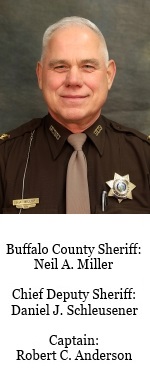
Mission Statement: "The mission of the Buffalo County Sheriff's Department is to enhance the quality of life in our county by working cooperatively with the public and within the framework of the U.S. Constitution to enforce the law, preserve the peace, reduce fear and provide for a safe environment for all of our citizens."
Department Structure: The Buffalo County Sheriff's Office is organized into two divisions, Operations and Support Services, under the direction of the Sheriff who is elected for a four (4) year term. The Operations Division consists of Civil Process, Warrant Section, Investigative Section, and Patrol Section and is currently managed by a Captain. The Support Services Section consists of the Sheriff's
Staff Section, Community Services Section, Training Section, Communications Section, and Detention Center Section and is currently managed by the Chief Deputy.
Social Media:
 
LOCATION: The department offices are located at 2025 Avenue A in Kearney, Buffalo County, Nebraska.
Regular business hours are 8:00 a.m. to 5:00 p.m. Monday - Friday.
A unique joint venture with the Buffalo County Sheriff's Office and the Kearney Police Department was formed in July 1993 when both agencies co-located to a remodeled building in downtown Kearney. By sharing resources, both agencies save taxpayers' money as well as establishing a good working relationship between the agencies and their employees.
The Sheriff's office oversees the dispatch duties and answers 911 calls for officers of both agencies.
The Police Department oversees the records and data processing functions for both agencies.
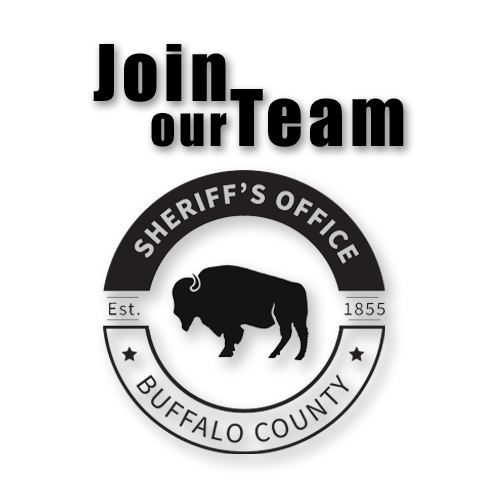
The Buffalo County Sheriff's Office responds to calls that occur in the county (outside of Kearney city limits). The Kearney Police Department responds to calls that occur within the city limits.
Both agencies assist each other as needed as well as working with law enforcement officers from other local jurisdictions in Buffalo County, Public Safety at the University of Nebraska at Kearney, and the Nebraska State Patrol.
Civilian fingerprinting is available by Buffalo County Sheriff's Office. BY APPOINTMENT ONLY.
1) Call 308-236-1804 to schedule an appointment, Monday - Friday, 8:30-11:00 am and 1:00 - 4:00 pm.
2) Fee is $20.
3) Do not come if experiencing any symptoms that include.
a) fever of above 100 F
b) shortness of breath or difficulty breathing.
For Emergencies: Dial 911
2022 PREA Audit
2023 PREA Annual Report
Treasurer
Treasurer: Brenda R. Rohrich (elected 4 yr. Term)
Deputy Treasurer: Michele L. Richardson
Duties:
- To collect all revenues for the County

- To bill and collect all real estate and personal taxes in the County
- To issue motor vehicle titles
- To register all motor vehicles with tax situs in the County
- To issue driver licenses, CDL’s, learner permits, ID cards, school permits, etc
- To disburse collections to the proper political subdivisions
- To register motor boats
- To register snowmobiles
General Information:
- Information on titling NEW motor vehicles and watercraft
- Information on titling previously owned motor vehicles and watercraft
- Information on titles coming from out of state
- Information on replacing a lost title
- Information on your first registration for cars, trucks, trailers, motorcycles and boats whether new or used
- Information on renewing registrations
- Information on registering snowmobiles
- Information on refunds
- Tax Sales and Tax Sale Certificates
Telephone Numbers:
Real Estate and Personal Property Taxes: (308) 236-1250
Motor Vehicle: (308) 236-1259
Tax Sales: (308) 236-1250
The Courthouse is located one block east of 2nd Avenue on 16th street.
Hours: 8:00 am to 5:00 pm Monday - Friday
Disclaimer Statement
NOTICE
The information provided by this service resides on a computer system funded by the County of Buffalo, Nebraska. Anyone using this service consents to the monitoring of their use of this service by the computer system providers, authorized County of Buffalo, Nebraska employees, as well as security or law enforcement personnel. Communications made through this service's electronic mail and Messaging system shall, in no way be deemed to constitute a filing with or legal notice to the County of Buffalo or any of its agencies, departments, authorities, officers, directors, employees, agents or representatives, with respect to any existing or potential claim or cause of action against the County or any of its agencies, departments, authorities, officers, directors, employees, agents or representatives, where notice to the County is required by any federal, state or local law, rule or regulation.
Government Offices can only accept written documents for filing into official government records unless specific statutory language authorizes filings done by other than written medium.
PRIVACY POLICY
The protection of individual privacy is a concern to Buffalo County. Buffalo County has created this privacy statement in order to demonstrate its firm commitment to privacy. The following discloses our information gathering and dissemination practices for this site.
Information You Provide to Us:
Buffalo County does not keep any personal information about you or your visit to our Internet site unless you have specifically supplied it to us. If you may have supplied us with information as part of a request for information or to e-file an appeal of your Board of Property Assessment decision. This also applies to any feedback or on-line survey information you may have sent us through our website. In cases where you have supplied us with information, including financial data, we will treat such information in accordance with the requirements of the law. This means that it will be treated in the same way as written forms of communication, and in many instances it will be considered public information available to the public upon request. To the extent allowed by law, Buffalo County will make reasonable attempts to protect personal financial information from disclosure.
Public Disclosure:
As a general rule, Buffalo County does not disclose any personally identifiable information collected online except where you have given us permission or where the information is public information under the Nebraska Public Records Act et seq., or other applicable laws. Visitors should be aware that information collected by the County on its websites may be subject to examination and inspection if such information is a public record and not otherwise protected from disclosure.
Other Information about Your Visit to Our Site:
Our web site does not automatically collect any information from your computer during your visit. Certain pages, however, may tally total number of visitors.
This privacy policy does not apply to web sites operated by third parties that you may access through a link from our web site.
DISCLAIMER OF WARRANTIES
The County of Buffalo makes no warranty or representation, express or implied, including but not limited to warranties of merchantability and fitness for a particular purpose. The County of Buffalo assumes no liability or responsibility for the quality, content, accuracy, completeness of the information, text, graphics, links and any other items contained on this service or any other system or service. The materials contained on this service have been compiled from a variety of sources and are subject to change without notice. Commercial use or sale of the materials contained on this service is prohibited without the express written consent of the County of Buffalo. In no event will the County of Buffalo be liable for any damages whatsoever, whether direct, indirect, consequential, incidental or special, or any claim for attorney's fees arising out of the use or inability to use the information on this service, even if the County of Buffalo is advised of the possibility of such damages.
COPYRIGHT STATUS
All documents available on this service may be protected under the United States and/or Foreign Copyright Laws. Permission to reproduce may be required. The County of Buffalo retains all rights to the information provided by this service, including, but not limited to, the right of reproduction.
DISCLAIMER OF ENDORSEMENT
Reference herein to any specific commercial products, process, or service by trade name, trademark, manufacturer, or otherwise, does not necessarily constitute or imply its endorsement, recommendation, or favored status by the County of Buffalo. The views and opinions of authors expressed on this service do not necessarily state or reflect those of the County of Buffalo, and shall not be used for advertising or product endorsement purposes.
The County of Buffalo is not, and shall not bear any responsibility for the contents of any off-site pages referenced.
Welcome
We invite you to browse our web site to learn about our various County offices and the services Buffalo County, Nebraska offers its citizens.
LB304 - Annual Memberships
Follow us on for current info as well. for current info as well.
This web site contains information about County programs,services, departments and offices, as well as helpful information oncommonly asked questions. We encourage you to use this site frequently to access meeting notices, Open Meetings Act, agendas, packets, and minutes of the County Board of Commissioners.
Buffalo County uses Beacon Bid to share solicitations with suppliers. Click on any solicitation and fill out the free form on Beacon. Or subscribe for free updates for our future bids and RFPs. You will receive an email with the link to download attachments. Please note that accurate contact information is required in order to receive any updates.
Beacon is free for bidders.
|